05:Lee has a friend
| Site: | CLASE CHINO |
| Course: | ENG |
| Book: | 05:Lee has a friend |
| Printed by: | Guest user |
| Date: | Tuesday, 1 July 2025, 10:39 PM |
Description
循序漸進學英語系列5:Lee has a friend(兒童英語教材典範之作)
Table of contents
- 目錄
- 循序漸進學英語系列5:Lee has a friend
- 1. How many children can you see? 你能看見多少個孩子?
- 2. I know lots of games now 我現在知道很多遊戲
- 3. It’s time to come in the house and eat 該進屋吃飯了
- 4. Please go and ask Lee to come here 請去叫李來這裡
- 5. I want to play with my friends 我想和我的朋友們一起玩
- 6. Lee knows how to read some of his books 李知道如何閱讀他的一些書
- 7. What are the two books you have at school? 你放在學校裡的兩本書是什麼書?
- 8. Pat likes to read to her friends 佩特喜歡為她的朋友們朗讀
- 9. Milk is very good for children 牛奶對孩子們很有好處
- 10. Let’s go and see what there is for breakfast 我們去看看早餐有什麼
- 11. Are you hungry? 你餓了嗎?
- 12. Lee wants a small breakfast 李想少吃早餐
- 13. You really know a lot about your friend Tom 你真的很瞭解你的朋友湯姆
- 14. Would you like something to eat? 你想喝什麼?
- 15. Where is the word you want me to read? 你想要我讀的單詞在哪裡?
- 16. Please try to be careful 請儘量小心
- 17. Is my English writing good? 我的英語書寫好嗎?
- 18. I like boys more than I like girls 比起女孩我更喜歡男孩
- 19. I think there are more balls in there 我想那裡還有很多球
- 20. Some new words are difficult for me to read 對我來說有些生詞難讀
- 21. It’s not lunchtime yet 還沒到午餐時間
- 22. How much meat is there? 有多少肉?
- 23. Do you have enough rice? 你的米飯夠了嗎?
- 24. Thank you for letting me come to have dinner 謝謝你讓我來吃晚餐
- 25. How much do you read in one day at school? 你們在學校一天讀多少書呢?
- 26. Would you like a little more meat? 你還想要一點肉嗎?
- 27. I can see you are very hungry today 我看得出來你今天很餓
- 28. I like the food you give us every day 我喜歡您每天給我們的食物
- Example Answers to Questions 課後提問參考答案
- Notes for Teachers and Parents 給教師和家長的註解
目錄
1. How many children can you see? 你能看見多少個孩子?
2. I know lots of games now 我現在知道很多遊戲
3. It’s time to come in the house and eat 該進屋吃飯了
4. Please go and ask Lee to come here 請去叫李來這裡
5. I want to play with my friends 我想和我的朋友們一起玩
6. Lee knows how to read some of his books 李知道如何閱讀他的一些書
7. What are the two books you have at school? 你放在學校裡的兩本書是什麼書?
8. Pat likes to read to her friends 佩特喜歡為她的朋友們朗讀
9. Milk is very good for children 牛奶對孩子們很有好處
10. Let’s go and see what there is for breakfast 我們去看看早餐有什麼
12. Lee wants a small breakfast 李想少吃早餐
13. You really know a lot about your friend Tom 你真的很瞭解你的朋友湯姆
14. Would you like something to eat? 你想喝什麼?
15. Where is the word you want me to read? 你想要我讀的單詞在哪裡?
16. Please try to be careful 請儘量小心
17. Is my English writing good? 我的英語書寫好嗎?
18. I like boys more than I like girls 比起女孩我更喜歡男孩
19. I think there are more balls in there 我想那裡還有很多球
20. Some new words are difficult for me to read 對我來說有些生詞難讀
21. It’s not lunchtime yet 還沒到午餐時間
22. How much meat is there? 有多少肉?
23. Do you have enough rice? 你的米飯夠了嗎?
24. Thank you for letting me come to have dinner 謝謝你讓我來吃晚餐
25. How much do you read in one day at school? 你們在學校一天讀多少書呢?
26. Would you like a little more meat? 你還想要一點肉嗎?
27. I can see you are very hungry today 我看得出來你今天很餓
28. I like the food you give us every day 我喜歡您每天給我們的食物
《循序漸進學英語系列5:Lee has a friend》
菲利普·吉布森 (Philip Gibson) 著
邱意琳, 程夢洋, 禹謙, Nathalie 譯
責任編輯:Fiberead
©Fiberead 纖閱科技文化(北京)有限公司 2018
©浙江出版集團數字傳媒有限公司 2018
本書版權為浙江出版集團數字傳媒有限公司所有,非經書面授權,不得在任何地區以任何方式反編譯、翻印、仿製或節錄本書文字或圖表。
DNA-BN:ECFD-N00010816-20170801
最後修訂:2018年08月14日
出版:浙江出版集團數字傳媒有限公司
浙江 杭州 體育場路347號
互聯網出版許可證:新出網證(浙)字10號
電子郵箱:service@bookdna.net
浙江出版集團數字傳媒有限公司為作者提供電子書出版服務。
本書電子版如有錯訛,祈識者指正,以便新版修訂。
©Zhejiang Publishing United Group Digital Media CO.,LTD,2018
No.347 Tiyuchang Road, Hangzhou 310006 P.R.C.
service@bookdna.net
纖閱科技文化(北京)有限公司
contact@fiberead.com
1. How many children can you see? 你能看見多少個孩子?
New Words
How many… ?
讀音:[hau][ˈmenɪ]
釋義: ……多少?
**********
Lee, Pat and their friends are playing in the garden. Can you see them? Can you see the children playing in the garden? How many children can you see? A lot. We can see a lot of children.
李、佩特和他們的朋友在花園裡玩耍。你能看見他們嗎?你能看到他們在花園裡玩耍嗎?你能看見多少個孩子?很多,我們能看到很多孩子。

We can see a lot of children playing in the garden. Some of the children have balls to play with. Some of the balls are red and some of them are black. How many balls can you see? A lot! The children have a lot of balls to play with today.
我們能看到很多孩子在花園裡玩耍。有些孩子在玩球。有些球是紅色的,有些是黑色的。你能看到多少個球?很多!今天孩子們有很多球可以玩。
Not all the children are playing with balls. Some of them are sitting down eating. What are they eating? Do you know? They are eating candy. Can you see the children eating candy? Can you see how many children are eating candy? Can you see who they are?
不是所有孩子們都玩球。有些孩子正坐著吃東西。他們在吃什麼?你知道嗎?他們在吃糖。你能看到孩子們在吃糖嗎?你能看到多少個孩子在吃糖?能看出他們是誰嗎?
**********

Mommy
Where are the children? Where are Lee and Pat now?
Daddy
They are in the garden. They are playing with their friends in the garden.
Mommy
How many children are in the garden?
Daddy
A lot. A lot of children are playing in the garden. Lee and Pat have a lot of friends now.
Mommy
That’s good! It’s good to have a lot of friends. I want Lee and Pat to have a lot of friends.
Daddy
I want them to have a lot of friends, too. I like to see them playing with their friends in the garden.
Mommy
Yes. I want them to play with their friends in the garden. I do not want to have a lot of children playing in the house.
Daddy
Some children are not playing. Some of them are sitting down and eating candy. They are eating a lot of candy.
Mommy
That’s not good! I do not want Lee and Pat to eat a lot of candy. It is not good for them!
媽媽
孩子們在哪?李和佩特現在在哪?
爸爸
他們在花園。他們和朋友們在花園玩。
媽媽
花園裡有多少個孩子?
爸爸
很多,很多孩子在花園裡玩。李和佩特現在有很多朋友了。
媽媽
太好了!有很多朋友是好事。我希望李和佩特有很多朋友。
爸爸
我也希望他們有很多朋友。我喜歡看到他們和朋友在花園裡玩耍。
媽媽
是的,我希望他們和朋友在花園玩。我不想讓一群孩子在屋子裡玩。
爸爸
有些孩子沒在玩,有些孩子坐著吃糖呢。他們在吃好多糖。
媽媽
那可不好!我不想讓李和佩特吃很多糖,這對他們不好。
**********
Now, Mommy and Daddy are coming from the house. They are going to see the children. They want to see Lee and Pat. Mommy goes to see Pat, and Daddy goes to see Lee.
媽媽和爸爸從屋子裡出來。他們要去看看孩子們,他們想看看李和佩特。媽媽去看佩特,爸爸去看李。

“Please give me your candy, Lee,” says Daddy. “Mommy does not want you to eat a lot of candy. Please give your candy to me.” Lee gives his candy to his daddy. “Here you are,” he says. “Here is my candy.”
“李,把你的糖給我,” 爸爸說,“媽媽不想讓你吃這麼多糖。請把你的糖給我。” 李把糖交給爸爸。“給你,” 他說,“這是我的糖。”
Lee gives all his candy to Daddy. Now, Lee can go and play with his friends. Lee has a lot of friends now and he likes to play with his friends in the garden.
李把他所有的糖果都交給了爸爸。他可以去和朋友們玩了。李有很多朋友,他喜歡和朋友們在花園裡玩。
**********
Questions
1. Where are the children playing?
2. Are some children playing with balls?
3. What are Lee and Pat doing?
4. Do Lee and Pat have a lot of friends now?
5. Is it good for children to eat a lot of candy?
**********
2. I know lots of games now 我現在知道很多遊戲
New Words:
know
讀音: [nəu]
釋義:知道,認識
don’t = do not
讀音: [dəunt]=[duː] [nɔt]
釋義:不要
**********

Now, all the children are playing together in Lee and Pat’s garden. Do you know these children? You know Lee and Pat, don’t you? Do you know their dog, too? Their dog’s name is Kim. Kim is a very good dog.
現在,所有孩子們們都在李和佩特的花園裡一起玩耍。你認識這些孩子嗎?你認識李和佩特,對吧?你也認識他們的狗嗎?他們的狗叫金,金是一條非常乖的狗。
Every boy in the garden has a ball. The girls do not have balls. The boys are playing a game together. The girls want to play this game, too. The girls want to take the balls from the boys and play the game.
花園裡的每個男孩都有一個球,女孩們沒有球。男孩們在一起玩遊戲,女孩們也想玩這個遊戲。女孩們想把球從男孩那裡拿過來玩這個遊戲。
Pat goes to see her brother, Lee. Lee gives her his ball. He gives her his red ball. Pat takes the red ball from Lee. She takes the ball and goes to see her friends.
佩特去找她的哥哥李,李把他的球給了她。他把他的紅色球給了她,佩特從李那裡拿走了紅色球。她帶著球去找她的朋友們。
Now, all the boys are giving their balls to the girls. The girls are taking the balls from the boys. They take the balls and go to play the game.
現在,所有的男孩們都把球交給女孩。女孩們接過男孩們的球,她們拿著球去玩遊戲。
How many balls do the girls have now? Do you know? A lot! Now, the girls have a lot of balls. They have all the balls! Now, the girls can play the game.
女孩們現在有多少個球?你知道嗎?很多!現在女孩們有很多球。所有的球都在她們這裡!現在女孩們可以玩遊戲了。
**********

Lee
Do you like playing that game, Pat?
Pat
Yes, I do. I know this game. It’s a very good game. It’s fun to play this game.
Lee
Here. Take this ball, too. Take this red ball and put it over there.
Pat
Where?
Lee
Over there. Take it over there and put it with your friends’ balls.
Pat
Over there? Yes, I see. Give me the ball, please.
Lee
Here you are. Now, you and your friends can play a new game with us.
Pat
A new game?
Lee
Yes, a new game. I know lots of games now. This new game is a game girls can play with boys. It’s a very good game. It’s a lot of fun!
李
佩特,你喜歡玩那個遊戲嗎?
佩特
是的,我喜歡。我知道這個遊戲,這是個很好玩的遊戲,玩這個遊戲很有趣。
李
給,把這個球也拿上。拿著這個紅球,把它放到那邊。
佩特
哪裡?
李
那邊,把球帶到那邊去,和你的朋友們的球放在一起。
佩特
那邊嗎?我知道了。請把球給我。
李
給你。現在你和你的朋友們可以和我們玩新遊戲了。
佩特
新遊戲?
李
是的,新遊戲,我現在知道很多遊戲。男孩和女孩可以一起玩這個新遊戲,這是個很好玩的遊戲,非常有趣。
**********
Now, the boys and girls are having a lot of fun. It is fun to play in this garden. All the boys and girls like to play in this garden. The children know this garden very well. They come to play in this garden every day. They play in this garden every day and they have a lot of fun.
現在,男孩女孩們玩得很開心,在花園裡玩耍很有趣。所有的男孩女孩們都喜歡在花園裡玩,孩子們對這個花園非常熟悉。他們每天都來這個花園玩耍,他們每天在這個花園玩耍,他們玩得很愉快。
Lee has a lot of friends now. His friends come to see him in the garden every day. They come to play with Lee. They are all very good friends. Lee and his friends can have a lot of fun in this garden every day.
李現在有很多朋友,他的朋友們每天都到花園裡來看他。他們來和李玩,他們都是好朋友。李和朋友們每天都能在花園裡玩得很開心。

Girls come to the garden every day, too. They come to play with their friend Pat. Pat knows a lot of girls now. They are all her friends. Pat has a lot of friends, and they all like to come and play with her in the garden. It’s a lot of fun to play in this garden!
女孩們也每天來花園,她們來和佩特玩耍。佩特現在認識很多女孩了,她們都是她的朋友。佩特有很多朋友,她們都喜歡和她在花園裡玩,在花園裡玩非常有趣。
**********
Questions
1. Do you know Lee and Pat?
2. What is their dog’s name?
3. Who does Lee give his red ball to?
4. Can the girls play a game with the boys?
5. Does Pat have a lot of friends now?
**********
3. It’s time to come in the house and eat 該進屋吃飯了
New Words:
time
讀音: [taɪm]
釋義:時間
can’t = can not = cannot
讀音: [kɑːnt] / [kæn][nɔt] / [ˈkænɔt]
釋義:不能
**********
Look at the children. We know some of these children. We know Lee and Pat. We know them very well. We don’t know all of their friends. Lee and Pat have a lot of friends now.
看看孩子們,我們認識他們中的一些人。我們認識李和佩特,我們非常瞭解他們。我們認不全他們所有的朋友,李和佩特現在有很多朋友。

Lee, Pat and their friends are playing a game. They are playing a game in the garden. Some of the children can play this game very well, and some of them can’t.
李、佩特和他們的朋友們在玩遊戲,他們在花園裡玩遊戲。有些孩子很會玩遊戲,有些孩子不會。
Kim, the dog, is in the garden, too. Kim can’t play this game very well. Kim does not know this game. The children can play this game very well. Kim cannot.
小狗金也在花園裡,金玩不好這個遊戲,金不懂這個遊戲。孩子們很會玩這個遊戲,金不會。
Now, Mommy is coming to see the children. She is coming in the garden. She is coming from the house. It is time to eat, and Mommy wants the children to go in the house with her. She wants them to go in and eat.
現在,媽媽來看孩子們,她來到花園裡。她從屋子裡出來。該吃飯了,媽媽想讓孩子們和她一起進屋,她想讓他們進屋吃東西。
**********

Mommy
Come on, children! It’s time to eat! Come in the house now!
Pat
Yes, Mommy. We are coming now.
Mommy
Lee! Come on! You come too! Come in the house!
Pat
Lee does not want to come in the house, Mommy. He wants to play the game with his friends.
Mommy
Lee can’t play the game now! It’s time to come in the house and eat.
Pat
Come on, Lee! It’s time to eat. Let’s go in the house. Mommy wants us to do that.
Mommy
Pat, please put all the balls in the house. Do you know where they go? Do you know where to put them?
Pat
Yes, Mommy. I know. The balls go in my room.
Mommy
Good. Take all the balls and put them in your room.
Pat
Yes, Mommy.
媽媽
快點,孩子們!該吃飯了!馬上進屋!
佩特
好的,媽媽,我們這就來。
媽媽
李!快點!你也回來!進屋了!
佩特
李不想進屋,媽媽。他想和朋友們玩遊戲。
媽媽
李現在不能玩遊戲了!該進屋吃飯了。
佩特
快點,李!該吃飯了!進屋吧,媽媽讓我們進屋。
媽媽
佩特,請把所有球都放進房子裡。你知道它們應該放到哪嗎?你知道要把它們放到哪嗎?
佩特
是的,媽媽,我知道,球要放到我房間去。
媽媽
很好,拿著所有的球,把它們放到你的房間去。
佩特
好的,媽媽。
**********
Now, Lee and Pat are taking the balls from their friends. They want to take all the balls. They want to take all the balls in the house and put them in their room.
現在,李和佩特從朋友們那裡接過球,他們想要拿走所有的球。他們想要拿走所有球,然後把它們放到房間裡去。

Now, it is not the time to play. It is time to go in the house and eat. It is time to eat and all the children are giving the balls to Lee and Pat. Lee and Pat have a lot of balls now. They have all the balls.
現在不是玩耍的時候,該進屋吃飯了。該吃飯了,所有孩子們都把球交給李和佩特。李和佩特現在有很多球,所有球都在他們這裡。
Lee and Pat have a lot of balls now. They have black balls, and they have red balls, too. “It’s time to go in the house,” says Lee. “We can’t play now. It’s time to go in and eat.”
李和佩特現在有很多球,有黑球,也有紅球。“該進屋了,”李說,“現在不能玩了,該進去吃飯了。”
All the children are happy. They don’t want to play now. They all want to go in the house and eat. All of Lee and Pat’s friends like to go in Lee and Pat’s house and eat with Lee, Pat, Mommy and Daddy.
所有孩子們都很開心,他們現在不想玩,他們都想進屋吃東西。李和佩特的所有朋友們都想進李和佩特的家,跟李、佩特、媽媽和爸爸一起吃飯。
**********
Questions
1. Do you know Lee and Pat?
2. Can some of the children play the game very well?
3. Is it time to eat now?
4. Does Lee want to go in the house?
5. What does Lee want to do?
**********
4. Please go and ask Lee to come here 請去叫李來這裡
New Words:
Tom
讀音: [tɔm]
釋義: n. 湯姆(男子名)
ask
讀音: [ɑːsk]
釋義: vt. 詢問
very much
讀音: [ˈverɪ][mʌtʃ]
釋義: adv. 非常
**********
Look here. Here is Lee in his garden. We know Lee, don’t we? We know Lee and we know his sister Pat, too. We know Lee and Pat. We don’t know all their friends. Lee and Pat have a lot of friends now.
看這裡,李在他的花園裡。我們認識李,對嗎?我們認識李,我們還認識他的妹妹佩特。我們認識李和佩特,我們並不認識他們所有的朋友們,李和佩特現在有很多朋友。
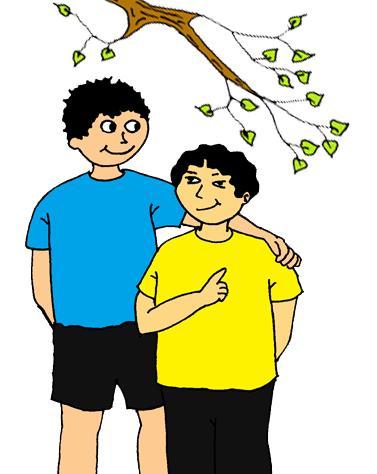
Lee is with Tom. Tom is Lee’s new friend. Tom likes to come and play with Lee in Lee’s garden. Tom comes to see Lee every day now. He comes to play with Lee in the garden and in the house. Lee likes Tom a lot. Tom likes Lee very much, too.
李和湯姆在一起,湯姆是李的新朋友。湯姆喜歡來李的花園裡和李一起玩。湯姆現在每天都來找李,他和李在花園裡和房子裡一起玩。李很喜歡湯姆,湯姆也很喜歡李。
Now, Lee is taking Tom to see his room. Tom likes that. He wants to see his new friend’s room. He wants to see what Lee has in his room. Lee and Tom are going to Lee’s room together. Tom can see what Lee has in his room, and the boys can play together in Lee’s room.
現在,李帶著湯姆去參觀他的房間,湯姆很喜歡。他想去看他的新朋友的房間,他想看李的房間裡有什麼。李和湯姆一起去李的房間,湯姆可以看到李的房間裡有什麼,兩個男孩子可以一起在李的房間裡玩。
**********

Mommy
Where is Lee, Pat? Do you know? Do you know where he is?
Pat
Yes, I do. He is in his room. He is in his room with his new friend.
Mommy
His new friend? Who is that? Who is Lee’s new friend?
Pat
Tom. Lee’s new friend is Tom. Tom is a boy from our school. He comes to see Lee every day now. Lee likes Tom very much, and Tom likes Lee a lot, too.
Mommy
That’s good. It’s good to have friends. It’s good for friends to play together, isn’t it?
Pat
Yes, it is. I have a lot of friends now, too.
Mommy
That’s good, too. I know all your friends. They are all very good girls and boys. I don’t know all Lee’s friends.
Pat
A lot of Lee’s friends are good, too. I like some of Lee’s friends. Some of them I don’t like very much.
Mommy
Please go and ask Lee to come here. Ask his friend to come here, too. It is time to eat. Ask Lee to come here. I want you and Lee to come here and eat now.
媽媽
李在哪裡,佩特?你知道嗎?你知道他在哪裡嗎?
佩特
是的,我知道。他和他的新朋友在他的房間裡。
媽媽
他的新朋友?是誰?誰是李的新朋友?
佩特
湯姆,他的新朋友是湯姆。湯姆是我們的同學,他現在每天都來找李。李很喜歡湯姆,湯姆也很喜歡李。
媽媽
這很好,有朋友是件好事。有朋友一起玩很不錯,不是嗎?
佩特
是的,我現在也有很多朋友了。
媽媽
這也很好,我認識你所有的朋友們,他們都是很好的男生和女生。我並不認識李所有的朋友。
佩特
李的很多朋友也很好。我很喜歡李的一些朋友,但有的我不是很喜歡。
媽媽
請去叫李來這裡,讓他的朋友也一起過來。到時間吃點東西了。讓李過來,我希望你去讓李現在過來吃東西。
**********
Lee is in his room with his new friend, Tom. They are playing together in the room. Lee and Tom are very good friends now. They like to sit together in the classroom at school. They like to play together at school, and now they can play together in Lee’s house.
李現在和他的新朋友湯姆一起在他的房間裡,他們一起在房間裡玩。李和湯姆現在是很好的朋友了。在學校的教室裡,他們喜歡坐在一起。在學校,他們喜歡一起玩,現在他們可以一起在李的家裡玩。
Pat goes to Lee’s room. She asks Lee to go and see Mommy. “What does Mommy want me to do?” asks Lee. “She wants you to come and eat,” says Pat. “It is time for us to eat now.”
佩特來到李的房間,她讓李去見媽媽。“媽媽讓我幹什麼?” 李問。“她想讓你去吃東西,” 佩特說,“現在是我們吃東西的時間。”
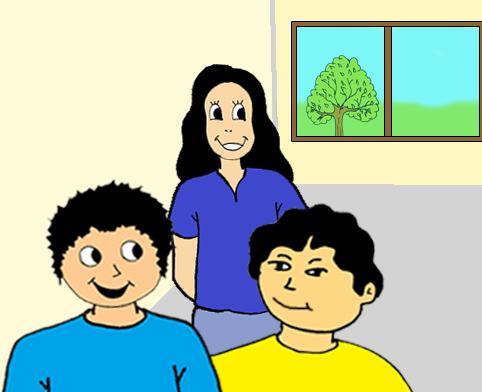
“Can I come, too?” asks Tom. “Can I come and eat with you?” “I don’t know,” says Lee. “Let’s go and ask Mommy.” “Yes,” says Tom. Let’s do that! Let’s go and ask your mommy. I like it in your house. I like it very much!”
“我也可以去嗎?” 湯姆問,“我可以跟你一起去吃嗎?” “我不知道,” 李說,“我們去問問媽媽。” “好的,” 湯姆說,“我們一起去吧!我們一起去問你媽媽吧。我喜歡在你家裡玩,非常喜歡!”
**********
Questions
1. Who is Lee with?
2. Where does Lee take Tom?
3. What does Tom want to see?
4. Does Mommy know all of Pat’s friends?
5. Does she know all of Lee’s friends?
5. I want to play with my friends 我想和我的朋友們一起玩
New Words :
my
讀音: [maɪ]
釋義:[I的所有格]我的
sorry
讀音:[ˈsɔrɪ]
釋義:對不起,抱歉
**********
“Can you see the children?” asks Mommy. “No, I can’t,” says Daddy. “I cannot see the children. I can’t see them. Where are they? Where are the children?”
“你看得到孩子們嗎?” 媽媽問。“不,我看不到,” 爸爸說,“我看不到孩子們,我看不到他們。他們在哪兒?孩子們在哪兒?”

“They are over there,” says Mommy. “They are over there playing in that tree. Can you see them now?” “Yes, I can,” says Daddy. “I can see them over there playing in my trees. That’s not good! I don’t want the children to play in my trees.”
“他們在那兒,” 媽媽說,“他們在那邊樹上玩。現在看到了嗎?” “是的,我看到了,” 爸爸說,“我能看到他們在我的樹上玩。這不好!我不希望孩子們在我的樹上玩。”
“How many children are playing in your trees?” asks Mommy. “A lot,” says Daddy. “A lot of children are playing in my trees. I don’t like that! Please ask the children to come down from my trees. Ask them to come down from my trees and go and play in the garden.”
“有多少孩子在你的樹上玩?” 媽媽問。“很多,” 爸爸說,“有很多孩子在我的樹上玩。我不喜歡這樣!請讓孩子們從我的樹上下來。讓他們從我的樹上下來,去花園裡玩。”
**********
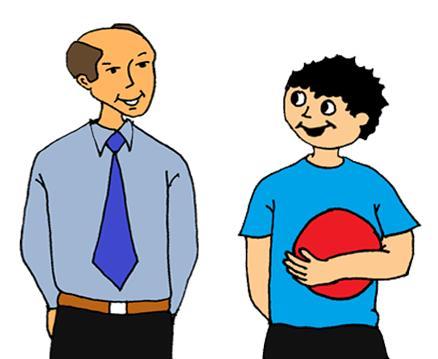
Daddy
Hello, Lee. What are you doing now?
Lee
I am taking my ball to the garden.
Daddy
What do you want to do in the garden?
Lee
I want to play with my friends. I want to play with them in the garden.
Daddy
How many friends do you have now, Lee?
Lee
A lot. I have a lot of friends now.
Daddy
Are your friends boys or girls?
Lee
Some of my friends are boys, and some of them are girls.
Daddy
And some of your friends are playing in my trees. I don’t want them to play in my trees. Please ask them not to do that.
Lee
Yes, Daddy. I am sorry. I am very sorry, Daddy.
爸爸
你好啊,李。你現在在幹什麼?
李
我帶著我的球去花園。
爸爸
你想在花園裡做什麼?
李
我想和我的朋友們一起玩,我想和他們在花園裡玩。
爸爸
你現在有多少朋友了,李?
李
很多,我現在有很多朋友。
爸爸
你的朋友們是男孩還是女孩啊?
李
有些是男孩,有些是女孩。
爸爸
你有些朋友在我的樹上玩。我不希望他們在我的樹上玩,請讓他們別這樣做。
李
好的,爸爸。對不起,我很抱歉,爸爸。
**********
Lee is asking his friends not to play in his daddy’s trees. “I am sorry,” he says. “You can’t play in the trees now. My daddy does not want you to do that. Please don’t play in my daddy’s trees now.”
李讓他的朋友們不要在他爸爸的樹上玩。“真抱歉,” 他說,“你們現在不能在樹上玩了。我爸爸不希望你們這麼做,現在請不要在我爸爸的樹上玩了。”

Now, Mommy is with Pat. “Who is that boy?” Mommy asks Pat. “I don’t know him. What is his name? “His name is Tom,” says Pat. “Is he your friend?” asks Mommy. “No, he isn’t,” says Pat. “He is not my friend. He is Lee’s friend. Lee likes him very much. He likes to play with him every day.”
現在媽媽和佩特在一起。“那個男孩是誰?” 媽媽問佩特,“我不認識他,他叫什麼名字?” “他的名字叫湯姆,” 佩特說。“他是你的朋友嗎?” 媽媽問。“不,他不是,” 佩特說,“他不是我的朋友,他是李的朋友。李非常喜歡他,他每天都喜歡和他一起玩。”
“Do you like to play with him, too?” Mommy asks Pat. “No, I don’t,” says Pat. “I don’t like him very much. I like to play with my friends. I don’t like to play with boys very much.”
“你也喜歡和他一起玩嗎?” 媽媽問佩特。“不,我不喜歡,” 佩特說,“我不是很喜歡他。我喜歡和我的朋友一起玩,我不太喜歡和男孩一起玩。”
**********
Questions
1. Who does not want the children to play in the trees?
2. Are all of Lee’s friends boys?
3. Who is Tom?
4. Does Lee like Tom?
5. Does Pat like to play with Tom?
**********
6. Lee knows how to read some of his books 李知道如何閱讀他的一些書
New Words:
there are…
讀音:[ðɛə][ɑ:]
釋義:有……
when…
讀音:[wen]
釋義:當……時
how (to do)
讀音:[hau][tə][duː]
釋義:如何/怎麼(做)
that’s… = that is
讀音:[ðæts] = [ðæt][ɪz]
釋義:那就是
**********
Now, there are no children in the garden. It is very cold in the garden today. When it is very cold, the children like to go in the house. All the children are in the house now. They are playing a game in Lee’s room. Pat and Lee are there. Tom is there, too.
現在,花園裡沒有孩子了。今天花園裡非常冷。當天氣很冷的時候,孩子們喜歡待在屋裡。所有孩子們現在都在屋裡,他們在李的房間裡玩遊戲。佩特和李都在那裡,湯姆也在那裡。

“Do you know how to play this game?” asks Lee. “No, I don’t,” says Tom. “I don’t know how to play that game.” “Pat and I know how to play the game,” says Lee. “You can play the game with us. We can play together.”
“你知道怎麼玩這個遊戲嗎?” 李問。“不,我不知道,” 湯姆說,“我不知道怎麼玩那個遊戲。” “佩特和我知道怎麼玩這個遊戲,” 李說,“你可以和我們一起玩遊戲,我們可以一起玩。”
Tom sits down at the table with Lee and Pat. He wants to see how Lee and Pat play this game. When Tom knows how to play the game, he can play it too.
湯姆跟李和佩特一起坐在桌子邊,他想看李和佩特怎麼玩這個遊戲。當湯姆知道怎麼玩這個遊戲時,他也可以玩了。
**********
Tom
Is this a good game?
Lee
Yes, it is. It’s a lot of fun. Come and play with us.
Tom
I don’t know this game. I don’t know how to play.
Lee
You sit down on that chair and look, Tom. Sit there and look at Pat and me playing the game.
Tom
Yes. I can look at you and Pat playing the game. When I see how you and Pat play the game, I can play too.
Lee
Look here, Tom. I take this and put it there. I put it over there.
Tom
I see. Is that good?
Lee
No, it isn’t. Now I see Pat can go there. When Pat goes there, she can take me.
Tom
That’s not good for you, is it?
Lee
No, it isn’t. I am not very good at this game.
湯姆
這個遊戲好玩嗎?
李
好玩,非常有趣。來和我們一起玩吧。
湯姆
我不懂這個遊戲,我不知道怎麼玩。
李
你坐在那把椅子上看吧,湯姆。坐在那裡,看佩特和我玩這個遊戲。
湯姆
好的,我可以看你和佩特玩這個遊戲。看看你們怎麼玩這個遊戲,我也可以玩了。
李
看,湯姆。我拿出這個,放在那裡,我把它放在那裡。
湯姆
看到了,這樣好嗎?
李
不,不好。現在我知道佩特可以走到那兒。當佩特走到那兒時,她就可以把我吃掉。
湯姆
這對你不好,是嗎?
李
是的,我不擅長玩這個遊戲。
**********
Today, Tom is with Lee in Lee’s room. They are looking at some books. There are a lot of books in Lee’s room. There are some small books, and there are some big books, too. Lee likes books.
今天,湯姆和李在李的房間裡,他們在看書。李的房間裡有很多書,有一些小書,也有一些很大的書。李喜歡書。
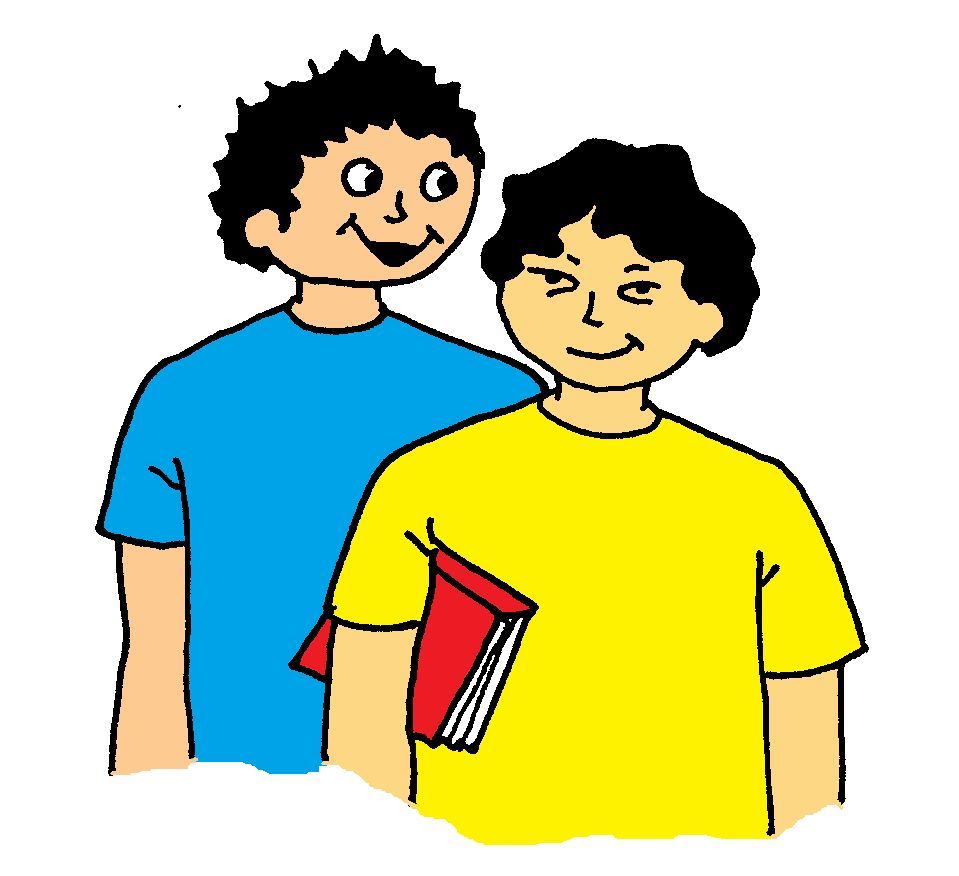
When Lee is in his room, he likes to look at his books. He likes to look at his books, and he likes to read them. Lee knows how to read some of his books. He likes to read. Lee likes to read small books.
當李在他的房間裡時,他喜歡看書。他喜歡看他的書,他喜歡讀書。李知道如何閱讀他的一些書,他喜歡讀書,李喜歡讀小書。
Lee and Tom are looking at a book. “This is a very good book,” Lee says. “I want to take it to school. When we are at school, I can ask the teacher to read it to us.” “Don’t you know how to read it?” asks Tom. “No,” says Lee. “I can read small books. This book is very big. I can’t read big books. I want to ask the teacher to read this book to us.”
李和湯姆在看一本書。“這是本非常好的書,” 李說,“我想帶到學校去。到了學校,我能讓老師讀給我們聽。” “你不知道怎麼讀嗎?” 湯姆問。“是的,” 李說,“我能讀小書,這本書太大了,我不會讀大書。我想讓老師讀這本書給我們聽。”
**********
Questions
1. Are there any children in the garden now?
2. When do the children like to go in the house?
3. Where are Lee and Pat now?
4. Does Tom know how to play the game?
5. Is Lee good at the game?
6. Who does Lee want to read his big book?
**********
7. What are the two books you have at school? 你放在學校裡的兩本書是什麼書?
New Words:
one
讀音:[wʌn]
釋義:一;一個
two
讀音:[tuː]
釋義:二,兩個
only
讀音:[ˈəunlɪ]
釋義:只,僅僅;唯一的,僅有的
morning
讀音:[ˈmɔːnɪŋ]
釋義:早晨
**********
Look here. This is Pat’s room. Can you see the table? Can you see the books on the table? How many books can you see? There are only two books on the table. One of the books is black, and one of them is red. One of the books is big, and one of them is small.
看這裡,這是佩特的房間。你能看見桌子嗎?你能看見桌子上的書嗎?你能看見桌子上有幾本書嗎?桌子上只有兩本書,其中一本是黑色的,另一本是紅色的。其中一本書大,另一本書小。

How many books does Pat have? Do you know? Pat has a lot of books. Pat likes to read books. Not all of Pat’s books are on this table. Only two of her books are on the table.
佩特有幾本書?你知道嗎?佩特有很多書,佩特喜歡讀書。不是所有佩特的書都在桌子上,她的書只有兩本在桌子上。
This morning, Pat wants to take these two books to school. When Pat is at school, she can read the books with her teacher. She can read them with her friends, too. Pat knows how to read now. Pat can read very well now.
今天早晨,佩特想帶這兩本書去學校。當佩特在學校的時候,她可以和她的老師一起讀書。她也可以和她的朋友一起讀。佩特現在知道如何朗讀,佩特現在可以朗讀得很好。
**********

Pat
Sorry, Mommy. Excuse me. Where is my new book? Do you know where it is?
Mommy
Your reading book or your writing book?
Pat
My new reading book. Do you know where my new reading book is?
Mommy
I am sorry, I don’t. Is it over there, on the table?
Pat
Yes, there it is. I have it now. This morning, I want to take this book to school. I want to read it with all my friends.
Mommy
That’s good. Do you have a lot of your books at school, too? Do you have a lot of your books in your classroom?
Pat
I only have two of my books at school. I have two books at school and a lot of books here in my room.
Mommy
What are the two books you have at school?
Pat
One of them is my old reading book, and one of them is my new writing book.
佩特
抱歉,媽媽,打擾一下。我的新書在哪裡?您知道它在哪嗎?
媽媽
你的閱讀書還是你的習字本?
佩特
媽媽
不好意思,我不知道。它是不是在那,在桌子上呢?
佩特
是,它在這呢,我現在拿到它了。今天早上我想帶這本書去學校,我想和我所有的好朋友一起讀這本書。
媽媽
這很好。你在學校也有很多書嗎?你在教室裡有很多書嗎?
佩特
我只有兩本書放在學校。我有兩本書在學校,有很多書在我的房間。
媽媽
你放在學校的兩本書是什麼書?
佩特
其中一本是我的舊閱讀書,另一本是我的新習字本。
**********
Look at these two boys. We know these two boys, don’t we? These two boys are Tom and Lee. “How many books do you have now, Tom?” asks Lee. “I have a lot of books now,” says Tom. Some of my books are new. A lot of them are old.”
看看這兩個男孩子,我們認識這兩個男孩,對嗎?這兩個男孩是湯姆和李。“你現在有幾本書,湯姆?” 李問。“我現在有很多書,” 湯姆說,“我的書有一些是新的,很多是舊的。”

“Pat has a lot of books. My books are in my room. I like to look at those books when I come home from school. You can come to my room with me. You can come and look at my books.”
“佩特有很多書。我的書在我的房間裡。從學校回到家裡的時候,我喜歡看這些書。你可以跟我一塊來我的房間,你可以過來看我的書。”
“Thank you,” says Tom. “I like to come to your house. I like to come to your house and I like to go in your room. Let’s go in your room and look at your books.”
“謝謝,” 湯姆說,“我喜歡去你家。我喜歡去你家,喜歡進你的房間。咱們進房間去看看你的書吧。”
**********
Questions
1. How many books are on the table?
2. Does Pat have a lot of books now?
3. Where does Pat want to take her books?
4. What does Pat want to do at school with her friends?
5. How many books does Tom have now?
6. Are all of Tom’s books new?
**********
8. Pat likes to read to her friends 佩特喜歡為她的朋友們朗讀
New Words:
our
讀音:[ˈauə]
釋義:我們的
but
讀音:[bʌt]
釋義:但是,然而
word
讀音:[wɜːd]
釋義:單詞,話語
doesn’t = does not
讀音:[ˈdʌznt] = [dəz] [nɔt]
釋義:不……(表示否定)
**********
Now, Lee and his friend Tom are together in the garden. They are looking at Lee’s books. “It’s cold here in the garden,” says Lee. “Let’s take our books in the house. We can look at our books in my room. It’s not cold in my room.”
現在李和他的朋友湯姆正一起在花園裡。他們正在看李的書。“花園裡有點冷,” 李說,“我們帶上我們的書進房子裡。我們可以在我的房間裡看書,我的房間裡不冷。”

“Yes,” says Tom. “Let’s take our books to your room. I like your room.” The boys take their books in the house and go to Lee’s room. In Lee’s room, the boys sit down and look at their books.
“好啊,” 湯姆說,“咱們帶上書進你的房間去,我喜歡你的房間。” 男孩們帶著他們的書進了房子,去了李的房間。在李的房間裡,他們坐下來看他們的書。
The book Tom is looking at has a lot of words that he doesn’t know. When Tom sees a word he doesn’t know, he can ask Lee to read it for him. Lee knows a lot of the words in that book. He knows a lot of the words, but he doesn’t know all of them. When Lee sees a word he doesn’t know, he can ask his sister or he can ask his daddy.
湯姆正在看的那本書有很多他不認識的單詞。每當湯姆看到他不認識的單詞,他可以請李為他讀出來。李認識那本書裡的很多單詞。他認識很多單詞,但是他不認識全部單詞。當李看到他不認識的單詞,他可以問他的妹妹或者可以問他的爸爸。
**********

Tom
Look at this book, Lee. I like this book. It’s very good.
Lee
Yes, it is a good book. It’s one of Pat’s books.
Tom
It’s a good book, but there are a lot of new words in it.
Lee
Yes, there are a lot of new words in that book. Can you read them all?
Tom
No, I can’t. I can read some of them, but I don’t know how to read all of them.
Lee
Look at that word. Can you read that word?
Tom
Sorry. What word? Where?
Lee
That word… there.
Tom
No, I can’t. I don’t know that word. Can you read it?
Lee
No. I am sorry, I can’t. It’s a new word for me, too. Let’s go and ask Pat. She knows how to read all the words in that book.
湯姆
李,看這本書。我喜歡這本書,這本書很好。
李
是的,這是一本好書,這是佩特的書。
湯姆
這是本好書,但是這裡面有很多新單詞。
李
對,這本書裡有很多新單詞。你能把它們全讀出來嗎?
湯姆
不,我不行。我可以讀出其中的一些,但我不會讀所有的單詞。
李
看這個單詞,你會讀這個單詞嗎?
湯姆
抱歉,哪個單詞?在哪裡?
李
這個單詞……在那裡。
湯姆
不行,我不會。我不認識那個單詞,你會讀嗎?
李
不,太不好意思了,我不行。這對我來講也是個生詞。我們去問問佩特,她知道怎麼讀這本書裡所有的單詞。
**********
Lee and his friend Tom are together again. We know Lee and Tom, don’t we? They are our friends. They are our friends in this book. What are they doing now? Can you see?
李和他的朋友湯姆又在一起了。我們認識李和湯姆,是嗎?他們是我們的朋友,他們是我們在這本書裡的朋友。他們在做什麼呢?你能看到嗎?

Lee and Tom are taking their books to Lee’s sister. They are taking them to Pat. They want Pat to read some of the new words for them. They know Pat can read all the words in those books.
李和湯姆帶著他們的書去李的妹妹那裡,他們要把這兩本書帶去給佩特。他們想讓佩特為他們讀這兩本書裡的幾個新單詞,他們知道佩特能讀出這兩本書裡的所有單詞。
Pat is very good at reading now. She is good at writing, too. When Pat is at school, her teacher likes to ask her to read to the children in the classroom. Pat likes to do that. She likes to read to her friends.
佩特現在非常擅長朗讀,她也擅長寫字。當佩特在學校的時候,她的老師喜歡請她為班上的孩子們朗讀。佩特喜歡這麼做,她喜歡為她的朋友們朗讀。
Pat likes to read to her friends. She likes to read to Lee, too. She likes to read to Lee, but she doesn’t like to read to Tom. Pat doesn’t like Tom very much.
佩特喜歡為她的朋友們朗讀,她也喜歡為李朗讀。她喜歡為李朗讀,但是她不喜歡為湯姆朗讀。佩特不太喜歡湯姆。
**********
Questions
1. Is it cold in the garden today?
2. Where can the boys take their books?
3. When Lee sees a word he doesn’t know, who can he ask to read it for him?
4. Can Pat read all the words in the book?
5. Who does Pat like to read to?
6. Does Pat like to read to Tom?
**********
9. Milk is very good for children 牛奶對孩子們很有好處
New Words:
drink
讀音:[drɪŋk]
釋義:喝,飲;飲料
milk
讀音:[mɪlk]
釋義:牛奶
orange-juice
讀音:[ˈɔrɪndʒ][dʒuːs]
釋義:橙汁
What’s… ? = What is… ?
讀音:[wɔts] = [wɔt] [ɪz]
釋義:……是什麼?
**********
Today, it is not cold in Lee’s garden. It is hot. It is very hot. Now, Tom is coming to Lee’s house. Lee can see his friend Tom coming in the garden. “Hello, Tom,” says Lee. “It’s very hot today, isn’t it?” “Hello, Lee,” says Tom. “Yes, it is. It’s very hot today.”
今天,李的花園裡不冷。天氣熱,天氣很熱。現在湯姆要來李家裡。李可以看到湯姆來到花園。“你好啊,湯姆,” 李說,“今天很熱,是嗎?” “你好啊,李,” 湯姆說,“是的,今天很熱。”

“Are you hot, too?” asks Tom. “Yes, I am,” says Lee. “I am very hot. Let’s go in the house. Let’s go in the house and have a cold drink.” “Yes” says Tom. “Let’s go in your house and have cold drinks – a lot of cold drinks! I am very, very hot!”
“你也熱嗎?” 湯姆問。“是,我熱,” 李說,“我很熱。我們進房子裡去,我們進房子裡喝些冷飲。” “好啊,” 湯姆說,“咱們進你的屋子裡喝些冷飲——喝很多冷飲!我非常非常熱。”
“Do you want to drink some water, some milk, or some orange-juice?” asks Lee. “Orange-juice, please,” says Tom. I don’t want to drink milk now. I like to drink orange-juice or cold water when I am hot. Please give me some orange-juice. I like orange-juice. I like it very much!”
“你想要喝水、牛奶還是橙汁?” 李問。“橙汁,謝謝,” 湯姆說,“我現在不想喝牛奶。在我熱的時候我喜歡喝橙汁或者冰水。我喜歡橙汁,我特別喜歡橙汁!”
**********

Pat
Hello, Tom. What are you doing in our house?
Tom
Hello, Pat. I’m looking for Lee. What’s that?
Pat
What’s what?
Tom
What’s that you’re drinking?
Pat
This? This is some milk. I like to drink milk. I drink it every morning. Do you want some milk?
Tom
No, thanks. I don’t like milk very much.
Pat
I do. I like to drink milk. My mommy says milk is very good for children.
Tom
Does she? I only like to drink orange-juice…orange-juice or water. Can you give me some orange-juice?
Pat
Yes, I can. And when I give you the orange-juice, please take it in the garden and drink it there.
佩特
你好,湯姆。你在我們房子裡做什麼?
湯姆
你好,佩特。我在找李,那是什麼?
佩特
什麼是什麼?
湯姆
你在喝什麼?
佩特
這個?這是牛奶。我喜歡喝牛奶,我每天早上都喝牛奶。你想喝牛奶嗎?
湯姆
不,謝謝。我不是特別喜歡牛奶。
佩特
我喜歡,我喜歡喝牛奶。我媽媽說牛奶對孩子們很有好處。
湯姆
她這麼說的?我只喜歡喝橙汁……橙汁或者水。你能給我橙汁嗎?
佩特
好,我可以給你。我給你橙汁之後,請拿著橙汁去花園裡喝。
**********
Where are the boys now? Can you see? Are they in the house, or are they in the garden? They are in the garden. Lee and Tom are together in the garden. What are they doing? Can you see?
男孩子們現在在哪裡?你能看到嗎?他們在房子裡,還是在花園裡?他們在花園裡,李和湯姆一起在花園裡。他們在幹什麼?你能看見嗎?
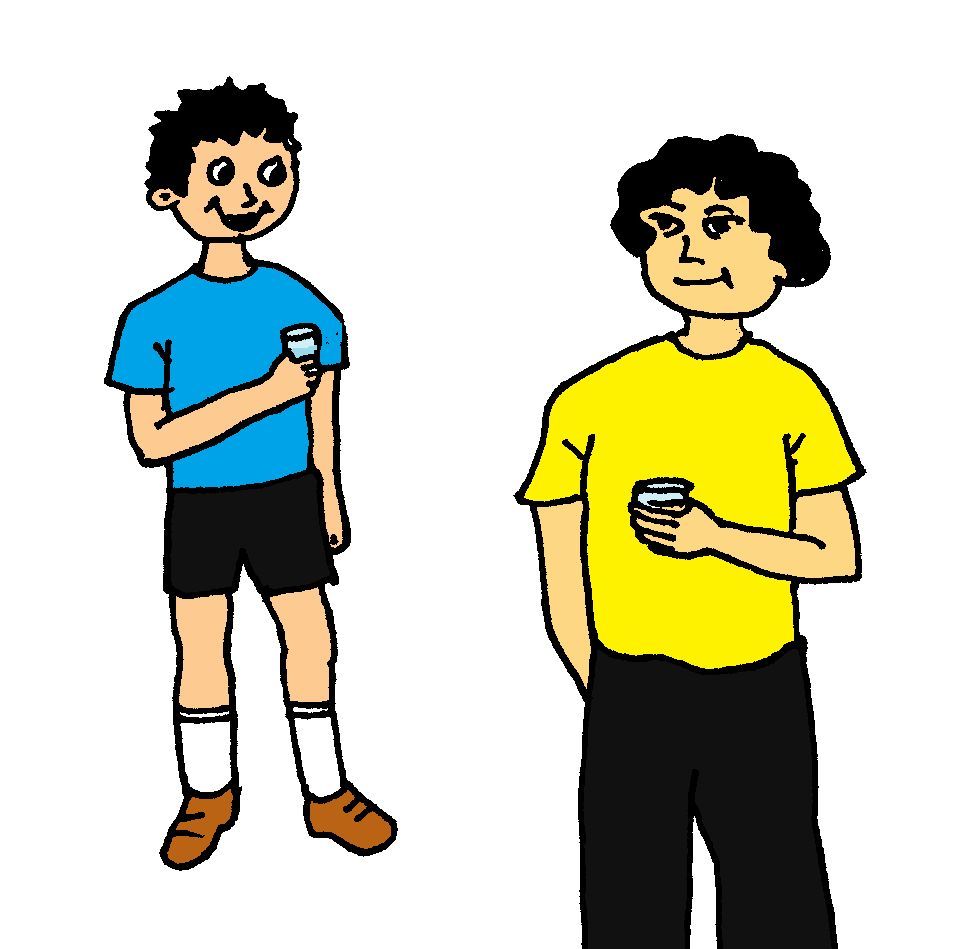
The boys are not playing now. It is very hot in the garden today and the boys do not want to play. What are they doing? They are drinking. What are they drinking? Can you see? Are they drinking water, milk or orange-juice.
現在男孩們沒有玩耍。今天花園裡很熱,男孩們不想玩。他們在幹什麼呢?他們在喝飲料。他們在喝什麼?你能看見嗎?他們在喝水、牛奶或者橙汁嗎?
They are drinking orange-juice. They like to drink orange-juice when it is hot. Tom likes to drink a lot of orange-juice. He likes to drink a lot of orange juice when it is hot, and he likes to drink a lot of orange juice when it is not hot.
他們在喝橙汁,他們喜歡在天熱的時候喝橙汁。湯姆喜歡喝很多橙汁,他喜歡在天熱的時候喝很多橙汁,他也喜歡在天不熱的時候喝很多橙汁。
**********
Questions
1. Is it hot today in Lee’s garden, or is it cold?
2. What does Tom want to drink?
3. When does Pat drink milk?
4. Where does Pat want Tom to drink his orange-juice?
5. Is Lee drinking milk?
6. Does Tom like to drink a lot of orange juice?
**********
10. Let’s go and see what there is for breakfast 我們去看看早餐有什麼
New Words:
there is
讀音:[ðεə][ɪz]
釋義:有
breakfast
讀音:[ˈbrekfəst]
釋義:早餐
food
讀音:[fuːd]
釋義:食物
**********
Look at Tom. He is in the garden with his friend, Lee. Tom and Lee are good friends. Tom likes to come to Lee’s big house. He likes Lee’s house, and he likes Lee’s big garden. Tom’s house is big, but it does not have a big garden. Tom’s garden is not very big, and there are no trees in Tom’s garden.
看看湯姆,他和他的朋友李在花園裡。湯姆和李是好朋友,湯姆喜歡來到李的大房子。他喜歡李的房子,他喜歡李的大花園。湯姆家的房子很大,但湯姆家的房子沒有大花園。湯姆家的花園不是很大,裡面沒有樹。

In Lee’s garden, there are a lot of trees. Some of the trees in Lee’s garden are very old now. Some of those trees are very big. There is one tree that is very, very big.
李的花園裡有很多的樹。李的花園裡有些樹現在已經很老了,其中有些樹很大,有一棵樹非常非常大。
Not all the trees in Lee’s garden are old. Some of them are new. Lee’s daddy likes the new trees. He does not want the children to play in the new trees. “Don’t play over there!” he says to Lee and Tom. “Don’t play in the new trees! You can only play in the big old trees. You can play in the big old trees, but I don’t want you to play in the small new trees!”
李花園裡的樹並非都是老樹,有些是新栽種的樹。李的爸爸喜歡那些新栽種的樹,他不想讓孩子們在新栽種的樹上玩耍。“不要在那邊玩!” 他對李和湯姆說,“不要在新栽種的樹上玩!你們只能在那些很大的老樹上玩。你們可以在那些老的大樹上玩,但我不希望你們新栽種的小樹上玩。”
**********
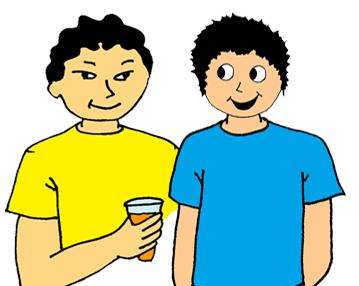
Tom
This orange-juice is very good. I like it.
Lee
Yes, it is. I like to drink a lot of orange-juice on hot days.
Tom
Me, too. I can see there is a lot of orange-juice in your house.
Lee
Yes, and there is a lot of milk, too. Is there a lot of orange-juice in your house?
Tom
No, there isn’t. We don’t have orange-juice in our house.
Lee
No orange-juice? What do you drink on hot days? What do you drink when it is very hot?
Tom
We only drink cold water. My mommy and daddy don’t like orange-juice or milk.
Lee
I see. Let’s go in the house now, Tom. Let’s go in the house and have breakfast. It’s time to have breakfast now.
Tom
Is it? Good! Is there a lot of food for breakfast today? Is your mommy putting a lot of food on the breakfast table for us?
Lee
I don’t know. Let’s go and see.
Tom
Yes. Let’s go and see what there is for breakfast.
湯姆
這個橙汁很好喝,我喜歡。
李
是啊,我喜歡在炎熱的天氣裡喝很多橙汁。
湯姆
我也是,我看到你家裡有很多橙汁。
李
是的,也有很多的牛奶。你家裡有很多橙汁嗎?
湯姆
不,我家沒有,我們家沒有橙汁。
李
沒有橙汁?那你在熱天裡都喝什麼?你在天氣很熱的時候喝什麼?
湯姆
我們只喝冰水。我媽媽爸爸不喜歡橙汁或牛奶。
李
我知道了。現在我們進屋吧,湯姆。我們進去吃早餐吧。吃早餐的時間到了。
湯姆
是嗎?好!今天的早餐有很多食物嗎?你媽媽在早餐桌上放了很多食物嗎?
李
我不知道,我們去看看吧。
湯姆
好的,我們去看看早餐有什麼。
**********
Pat is not in the garden with Lee and Tom. She is in the house. Pat does not like to play in the garden very much. She likes to be in the house. She likes to be in the house and look at her books. Now, Pat is looking at a book with Mommy. They are looking at Pat’s new reading book.
佩特沒有跟李和湯姆在花園裡,她在房子裡。佩特不是很喜歡在花園裡玩,她喜歡待在房子裡,她喜歡在房子裡讀書。現在,佩特在和媽媽看一本書,她們在看佩特的新閱讀書。

Pat does not know all the words in this book. She only knows some of them. Pat only knows some of the words, but Mommy knows all of them. Mommy is very good at reading.
佩特不認識這本書裡的所有單詞,她只認識一部分。佩特只認識一部分單詞,但媽媽全都認識。媽媽很會閱讀。
“We can read this book together,” says Mommy. “I want you to know some of the new words in this book. When you know one or two of the new words, we can go and have breakfast. There is some very good food for breakfast today.”
“我們可以一起讀這本書,” 媽媽說,“我想讓你認識這本書裡的一些新單詞。等你認識一兩個新單詞以後,我們就可以去吃早餐了。今天的早餐有很好吃的食物。”
**********
Questions
1. Who is Lee with now?
2. Where are they?
3. Is Tom’s garden big?
4. Is there a very big tree in Lee’s garden?
5. Is it time for breakfast now?
6. Is there some very good food for breakfast today?
**********
11. Are you hungry? 你餓了嗎?
New Words:
hungry
讀音:[ˈhʌŋgrɪ]
釋義:飢餓的
a little
讀音:[ə][ˈlɪtl]
釋義:一點
get / getting
讀音:[get]/[g'etɪŋ]
釋義:拿
**********
Now, Lee and his friend are coming in to the house to see Mommy. Mommy is in the house getting breakfast for the children. “Hello, Mommy,” says Lee. “Do you know who this is?” “No, I don’t,” says Mommy. “Is he one of your friends?”
現在,李和他的朋友要進屋子裡面去看媽媽。媽媽正在房子裡給孩子們準備早餐。“您好,媽媽,” 李說,“您知道這是誰嗎?” “不,我不知道,” 媽媽說,“他是你的朋友嗎?”

“Yes, he is,” says Lee. “He is my new friend. His name is Tom, and he wants to have breakfast with us this morning. “
“是的,他是,” 李說,“他是我的新朋友,他叫湯姆。他今天早晨想和我們一起吃早餐。”
“I see,” says Mommy. “Are you hungry Lee,” asks Mommy. “No, I am not,” says Lee. “I don’t want to eat a lot this morning. I only want to eat a little. I don’t want to eat a lot, but my friend does. My friend is very, very hungry!”
“我知道了。” 媽媽說。“你餓了嗎,李?” 媽媽問。“不,我不餓,” 李說,“我今天早晨不想吃很多,我只想吃一點。我不想吃很多,但我的朋友想。我的朋友非常非常餓!”
**********
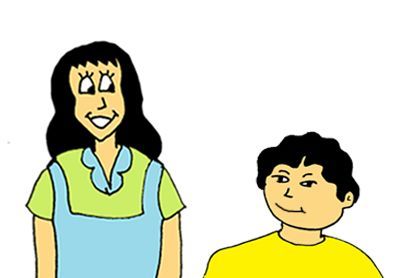
Mommy
Hello, Tom. How are you?
Tom
I’m very well, thank you. And you?
Mommy
I’m very well, too. Are you hungry?
Tom
Yes, I am. I’m very hungry. Can we have breakfast now?
Mommy
Yes, we can. I’m getting it now.
Tom
Are you? Good!
Mommy
Do you want to have some water, Tom? There’s some water on the table over there.
Tom
No, thank you. I don’t want to drink now. I only want to eat.
Mommy
I see. I can see you are a very hungry boy today.
Tom
Yes, I am. I’m a very hungry boy every day!
媽媽
你好,湯姆。你好嗎?
湯姆
我很好,謝謝。您呢?
媽媽
我也非常好。你餓了嗎?
湯姆
是的。我非常餓,我們現在能吃早餐嗎?
媽媽
當然可以,我正在準備早餐。
湯姆
是嗎?太好了!
媽媽
你想要喝些水嗎,湯姆?那邊的桌子上有水。
湯姆
不了,謝謝。我現在不想喝,我只想吃東西。
媽媽
我知道了,我能看出來你今天非常餓。
湯姆
是的,我每天都很餓!
**********
This morning, Lee is having breakfast with his new friend, Tom. Mommy is getting breakfast for the children. “Now it’s time to have our breakfast,” says Lee. “Let’s go and have breakfast.”
今天早晨,李和他的新朋友湯姆一起吃早餐。媽媽在為孩子們準備早餐。“現在到了我們吃早餐的時間,” 李說,“我們去吃早餐吧。”

“Please sit down at the table, Tom,” says Mommy. “Please sit down and have breakfast with us.” “Thank you very much,” says Tom. “I am very hungry today. I am very, very hungry!”
“請坐在餐桌這邊,湯姆,”媽媽說,“請坐下和我們一起吃早餐。” “很感謝您,” 湯姆說,“我今天非常餓,我非常非常餓!”
Tom sits down at the breakfast table with his friend, Lee. Daddy and Pat come and sit down at the breakfast table, too. Now, it is time to eat. It is time to eat breakfast. This morning, Pat, Mommy and Daddy are hungry. They are hungry, but Lee’s new friend is very, very hungry!
湯姆和他的新朋友李一起在早餐桌邊坐下。爸爸和佩特也來到早餐桌邊坐下。現在到了用餐的時候,到了吃早餐的時候。今天早晨,佩特、媽媽和爸爸餓了。他們餓了,而李的新朋友非常非常餓!
**********
Questions
1. Does Mommy know Lee’s new friend?
2. Who is getting breakfast for the children?
3. Can Tom have breakfast with Lee?
4. Does Tom want to eat a little, or does he want to eat a lot?
5. Is it time to have breakfast now?
6. Where does Tom sit down?
**********
12. Lee wants a small breakfast 李想少吃早餐
New Words:
rice
讀音:[raɪs]
釋義:米,米飯
meat
讀音:[miːt]
釋義:肉
egg
讀音:[eɡ]
釋義:蛋
**********
Now, Daddy is with Lee. “I’m sorry, Lee,” says Daddy. “I don’t know your friend’s name.” “You can ask him,” says Lee. “You can ask him what his name is,” “What is your name?” asks Daddy. “My name is Tom,” says Tom. “I am Lee’s new friend.”
現在爸爸和李在一起。“對不起,李,” 爸爸說,“我不知道你朋友的名字。” “您可以問他,” 李說,“你可以問他叫什麼名字。” “你叫什麼名字?” 爸爸問。“我的名字叫湯姆,” 湯姆說,“我是李的新朋友。”

“I am happy to see you,” says Daddy. “How are you today? Are you well?” “Yes, I am,” says Tom. “I’m very well. And you? Are you well?” “Yes, I am,” says Daddy. “I’m very well, too.”
“我很高興見到你,” 爸爸說,“你今天如何?今天好嗎?” “是的,我很好。您呢?您今天好嗎?” “是的,” 爸爸說,“我也很好。”
“Let’s all eat together,” says Daddy. “Let’s all eat breakfast together. It’s time to eat. Mommy is getting breakfast for us now. I’m very hungry. Are you boys hungry, too?” “Yes,” says Lee. “I am a little hungry, but my friend Tom is very, very hungry!”
“我們一起用餐吧,” 爸爸說,“我們一起吃早餐吧。到了用餐的時間。孩子們的媽媽在給我們準備早餐。我非常餓,你們餓嗎,孩子們?” “是的,” 李說,“我有一點餓,但我的朋友湯姆非常非常餓!”
**********

Daddy
Lee, ask your friend to come and sit down at the breakfast table with us.
Lee
Yes, Daddy. Tom! Come over here. You can sit down with us at the breakfast table here. It’s time to sit down and have breakfast.
Daddy
What is for breakfast today, Lee? Do you know?
Lee
Yes, I do. There is some rice. There are some eggs and there is some meat for breakfast this morning.
Daddy
Is there a lot of meat?
Lee
No, there isn’t. There’s only a little meat today, but there are a lot of eggs.
Daddy
I see. That’s good! I like to have eggs for breakfast.
Lee
I do, too. Is it time to eat now?
Daddy
Yes, it is. Are you hungry?
Lee
Yes, I am. I am a little hungry, but my friend Tom is very, very hungry!
爸爸
李,請你的朋友來早餐桌旁和我們一起坐下。
李
好的,爸爸。湯姆!過來。你可以和我們一起在餐桌旁坐下。現在是坐下吃早餐的時間。
爸爸
今天的早餐有什麼,李?你知道嗎?
李
是的,我知道有米飯。今天的早餐還有雞蛋和肉。
爸爸
有很多肉嗎?
李
不,沒有。今天只有一點肉,但有許多雞蛋。
爸爸
我知道了,這很好!我喜歡在早餐時吃雞蛋。
李
我也是,現在到時間用餐了嗎?
爸爸
是的,你餓了嗎?
李
是的,我有一點餓,但我的朋友湯姆非常非常餓!
**********
Mommy, Daddy, Lee, Pat and Tom are all hungry this morning. They all want to have breakfast now. This morning, Mommy is getting breakfast. She is putting it on the table and Lee, Tom and Daddy are looking at all the food. There is a lot of food on the table.
媽媽、爸爸、李、佩特和湯姆今天早晨都餓了,他們現在都想吃早餐。今天早晨,媽媽在準備早餐。她把早餐放在桌子上,李、湯姆和爸爸看著桌上的食物,桌子上有很多食物。

There is some rice on the table. There is some rice and there are a lot of eggs. There are a lot of eggs, but there is not a lot of meat. Mommy wants the children to eat a lot of rice and eggs, but she wants them to eat only a little meat.
桌子上有米飯,有米飯和很多雞蛋。有很多雞蛋,但肉不多。媽媽想讓孩子們多吃米飯和雞蛋,但她只想讓他們吃一點肉。
Lee, Pat, Tom and Daddy are all very happy. They can see that Mommy’s breakfast looks very good, and they are all hungry. Daddy, Mommy and Pat like to eat a big breakfast when they are hungry, but Lee only wants to eat a small breakfast today. Lee wants to eat a small breakfast, but his friend Tom wants to eat a very, very big breakfast!
李、佩特、湯姆和爸爸都很開心,他們看到媽媽的早餐看起來很好吃,他們都很餓。爸爸,媽媽和佩特餓的時候喜歡吃一頓豐盛的早餐,但是李只想少吃早餐。李想少吃早餐,但他的朋友湯姆想吃很多很多早餐!
**********
Questions
1. Is Daddy happy to see Lee’s new friend?
2. Who is getting breakfast?
3. Where can Tom sit down to eat breakfast?
4. Are there some eggs for breakfast?
5. Is there some meat?
6. Where can Mommy put the food?
**********
13. You really know a lot about your friend Tom 你真的很瞭解你的朋友湯姆
New Words:
right
讀音:[raɪt]
釋義:真實的,正確的
about
讀音:[əˈbaut]
釋義:關於
really = very
讀音:[ˈrɪəlɪ] / [ˈverɪ]
釋義:非常,很
Really? = Is it true?
讀音:[ˈrɪəlɪ]/ [ɪzɪtˈtruː]
釋義:真的嗎?
**********
Mommy is getting breakfast for Daddy and the children. “Here you are,” she says. “Here is your breakfast.” “Thank you very much,” says Tom. “This breakfast looks really good. I am very happy to come to your house and eat breakfast with you. Your food looks very, very good!” “Really? Thank you very much,” says Mommy. “Now, let’s eat.”
媽媽在為爸爸和孩子們準備早餐。“給你,” 她說,“這是你的早餐。” “非常感謝,” 湯姆說,“早餐看起來很好吃。我很高興能來你們家和你們一起用餐。您做的飯看起來非常美味!” “真的嗎?謝謝你。” 媽媽說,“現在我們吃吧。”

“Lee, do you want some rice?” asks Mommy. “Only a little, please,” says Lee. “I like rice, but I only want to eat a little for breakfast today.” “What about eggs?” asks Mommy. “Do you want some eggs?” “Yes, please,” says Lee. “Please give me two eggs.”
“李,你想吃米飯嗎?” 媽媽問道。“只要一點點,” 李說,“我喜歡米飯,但今早我只想吃一點。” “雞蛋呢?” 媽媽問,“你想要吃雞蛋嗎?” “要,” 李說,“請給我兩個雞蛋。”
Mommy gets two eggs for Lee. “Here you are,” she says. “Here are two eggs for you and a little rice. Now, what about Pat? What does Pat want to eat this morning?”
媽媽給了李兩個雞蛋。“給你,” 她說,“這是你的兩個雞蛋和一點米飯。佩特呢?佩特今早想吃什麼?”
**********

Mommy
Are you hungry this morning, Pat?
Pat
No, I’m not very hungry. I only want to eat a little this morning.
Mommy
I see. You can have a little rice, one egg and a little meat.
Pat
Thank you Mommy. It looks very good.
Mommy
Thank you. You only want to eat a little, but your friend, Tom, want to eat a lot.
Pat
That’s right. Tom eats a lot every day. He eats a lot at his house. He eats a lot at school, and now he wants to eat a lot at our house, too!
Mommy
Really? You really know a lot about your friend Tom, don’t you?
Pat
That’s right. I do know a lot about him. And Mommy?
Mommy
Yes, Pat?
Pat
Tom is not my friend. He is Lee’s friend.
媽媽
你今早餓嗎,佩特?
佩特
不,不是特別餓。今早我只想吃一點東西。
媽媽
知道了。你可以吃點米飯,吃個雞蛋和一點肉。
佩特
謝謝媽媽,看起來不錯啊。
媽媽
謝謝。你只想吃一點,可你的朋友湯姆想吃很多啊。
佩特
對,湯姆每天都吃很多。他在家就吃很多,在學校吃很多,現在在咱們家也想吃很多!
媽媽
真的嗎?你真的很瞭解你的朋友湯姆,不是嗎?
佩特
是啊,我確實很瞭解他。但是,媽媽?
媽媽
佩特,怎麼了?
佩特
湯姆不是我的朋友,他是李的朋友。
**********
“What about you, Tom?” asks Mommy. “Do you want a little rice like Lee and Pat, or do you want a lot?” “A lot, please,” says Tom. “Please give me a lot of rice.” What about eggs?” asks Mommy. “How many eggs can I give you?” “Two eggs, please,” says Tom. I really like eggs.”
“湯姆,你想吃什麼?” 媽媽問,“像李和佩特那樣來少點米飯?還是多來些?” “多來些。” 湯姆說,“請多給我米飯。” “雞蛋呢?” 媽媽問,“我給你多少個雞蛋呢?” “兩個,” 湯姆說,“我非常喜歡吃雞蛋。”

Mommy gives Tom two eggs and a lot of rice. “Do you want a little meat?” she asks. “No thank you,” says Tom. “Please give me a lot of meat. I really like meat. I like to eat a lot of meat every day.”
媽媽給了湯姆兩個雞蛋和很多米飯。“來少點肉嗎?” 她問。“不,謝謝,” 湯姆說,“請多給我一些肉。我很喜歡吃肉,我每天都喜歡吃很多肉。”
“Tom really likes all food,” says Pat. “He likes all food and he likes to eat all the time.” “You are right,” says Tom. “I like rice, meat, fish, apples, bananas, oranges…” “What about ice-cream?” asks Lee. Do you like ice-cream?” Yes, I do,” says Tom. “I really, really, really like ice-cream!”
“湯姆真的喜歡所有食物,” 佩特說,“他喜歡所有食物,喜歡不停地吃。” “對,” 湯姆說,“我喜歡米飯、肉、魚、蘋果、香蕉、橘子……” “冰激凌呢?” 李問,“你喜歡吃冰激凌嗎?” “喜歡,” 湯姆說,“我非常非常喜歡吃冰激凌!”
**********
Questions
1. Who can give the children their breakfast?
2. Does Lee want a lot of rice, or does he only want a little?
3. How many eggs does Pat have?
4. Does Tom want a lot of meat, or does he only want a little?
5. What food does Tom like?
6. What about you? What food do you like?
**********
14. Would you like something to eat? 你想喝什麼?
New Words:
fish
讀音:[fɪʃ]
釋義:n. 魚,魚肉
Would you like… ?
讀音:[wudjuːˋlaɪk]
釋義:你想……?你願意……?
something
讀音:[ˈsʌmθɪŋ]
釋義:某事,某物
**********
This morning, the children are sitting with Mommy and Daddy at the breakfast table. They are looking at all the food on the table. Today, the food looks very good, and one of the children is really hungry this morning. Do you know who that is? Do you know who is really hungry?
今早孩子們和爸爸媽媽坐在早餐桌旁,他們看著桌上的食物。今天這些食物看起來很好吃,有個孩子今天很餓。你知道這個孩子是誰嗎?你知道誰很餓嗎?

On the breakfast table, there is some rice, there are some eggs and there is a little meat, too. Now, Mommy is getting some fish for Daddy and the children. She is putting the fish on the table with the rice and the meat. There is only a little meat today.
早餐桌上有米飯,有幾個雞蛋,還有一點肉。媽媽給爸爸和孩子們準備了魚,她把魚、米飯和肉放在桌上。今天只有一點肉。
“Would you like to have some meat, or would you like to have some fish, Tom?” Mommy asks. “Meat AND fish please,” says Tom. “Here you are, Tom,” says Mommy. “Here is some meat for you, and here is some fish.” “Thank you,” says Tom. It looks very good. I really like your food and I am very hungry today!”
“湯姆,你想吃肉,還是想吃魚?” 媽媽問。“肉和魚都要。” 湯姆說。“給你,湯姆,” 媽媽說,“這是肉,這是魚。” “謝謝,” 湯姆說,“看起來很好吃。我真的喜歡您做的飯,我今天特別餓!”
“You like ALL food,” says Pat. “You are right,” says Tom. “And you are hungry all the time,” says Pat. “You are right about that too,” says Tom.
“你喜歡所有食物。” 佩特說。“你說得對。” 湯姆說。“你總是餓。” 佩特說。“這個你也說對了。” 湯姆說。
**********

Mommy
Look at Tom! He really is eating a lot!
Daddy
Yes, he is. Tom is a very hungry boy today, and he really likes your food.
Mommy
That’s right. Look at him now! He’s eating rice, fish, eggs, meat, bananas…
Daddy
What about Pat? She isn’t eating a lot this morning. She is only eating a little.
Mommy
I know. Pat is not very hungry this morning.
Daddy
This food looks very good.
Mommy
Thank you. Would you like some meat with your rice?
Daddy
Yes, please. But only a little.
Mommy
Here. I can get some meat for you. There. There is a little meat for you.
Daddy
Thank you. Thank you very much. Our breakfast looks really good today.
媽媽
看湯姆!他真的吃好多東西!
爸爸
是啊。湯姆今天很餓,他真的喜歡你做的飯。
媽媽
對。快看他!他在吃米飯、魚、雞蛋、肉、香蕉……
爸爸
佩特呢?她今早沒怎麼吃東西,她只吃了一點點。
媽媽
我知道,佩特今早不怎麼餓。
爸爸
這食物看起來很好吃。
媽媽
謝謝。你想來點肉搭配米飯嗎?
爸爸
好的,但只要一點點。
媽媽
給,我可以給你點肉。這兒,這是給你的一些肉。
爸爸
謝謝,非常感謝。今天的早餐看起來真好吃。
**********
“Would you like something to drink, Tom?” asks Mommy. “You can have orange-juice, milk or water.” “Orange-juice please,” says Tom. “I really like your orange-juice.” “Do you?” says Daddy. “Lee really likes our orange-juice, too.”
“湯姆,你想喝什麼?” 媽媽問,“橙汁、牛奶、還是水?” “請給我橙汁,” 湯姆說,“我很喜歡您的橙汁。” “是嗎?” 爸爸說,“李也很喜歡我們家的橙汁。”

“You are right Daddy,” says Lee. “I like to drink a lot of orange-juice at breakfast every morning.” “I don’t,” says Pat. “I don’t like orange-juice very much. I only like to drink milk when we have breakfast.”
“對啊,爸爸,” 李說,“我每天早餐的時候都喜歡喝很多橙汁。” “我不喜歡,” 佩特說,“我不是很喜歡橙汁。我只喜歡在我們吃早餐的時候喝牛奶。”
“Would you like some milk now Pat,” asks Mommy. “Yes, please,” says Pat. “And Mommy… Lee’s friend wants to have some of Lee’s rice, fish, meat and eggs. Can he? Can Tom have some of Lee’s rice, fish meat and eggs?”
“想要喝牛奶嗎?” 媽媽問。“要,” 佩特說,“媽媽……李的朋友想要吃李的米飯、魚、肉和雞蛋。他能吃嗎?湯姆能吃李的米飯、魚、肉和雞蛋嗎?”
**********
Questions
1. Where are the children sitting this morning?
2. Does the food look very good?
3. Who really likes all food?
4. What is Tom eating?
5. Is Pat eating a lot this morning?
6. When does Lee like to drink a lot of orange-juice?
**********
15. Where is the word you want me to read? 你想要我讀的單詞在哪裡?
New Words:
all right (alright)
讀音:[ɔːlˈraɪt]
釋義:好吧,沒問題
page
讀音:[peɪdʒ]
釋義:(書、報紙、文件等的)頁、面
**********
Now, our friend Lee can read a little. He knows how to write a little, too. Every day, Lee reads two pages from his reading book. He reads two pages from his reading book, and he writes one page in his writing book.
現在,我們的朋友會讀一點點東西,他也會寫一點點。李每天都讀兩頁閱讀書。他讀兩頁閱讀書,寫一頁習字本。

What about Tom? Tom can read well, and he can write well, too. Lee and Tom like to read and write. They are good at reading and writing now. They like to look at their reading books, and they like to read new words. They like to read new words, and they like to write new words, too.
湯姆呢?湯姆讀得好,也寫得好。李和湯姆喜歡讀寫,他們現在擅長讀寫。他們喜歡看閱讀書,喜歡讀新單詞。他們喜歡讀新單詞,也喜歡寫新單詞。
When the boys don’t know a new word, they can ask their teacher. When they don’t know something, it is all right to ask the teacher. Every day, the teacher has new words for the children. The teacher writes the new words, and the children read the new words.
男孩們看到不認識新單詞的時候,可以問老師。他們看到不懂的東西時,可以問老師。每天老師都給孩子們講新單詞。老師寫新單詞,孩子們讀新單詞。
**********

Tom
Lee, I don’t know this word and I don’t know how to read it. Would you read it for me please?
Lee
All right. Give me your reading book.
Tom
Here you are. Here is my reading book.
Lee
Where is the word you want me to read?
Tom
There it is… on that page there. Do you know that word?
Lee
No, I don’t. That is a new word for me, too. I don’t know that word.
Tom
Really? Let’s ask the teacher. She can read it for us.
Lee
All right. We can ask the teacher to read it for us at school. The teacher says she wants us to ask her about the words we don’t know.
Tom
That’s right. The teacher wants us to know all the new words in our reading book.
湯姆
李,我不認識這個單詞,我也不知道怎麼讀。你能給我讀一下嗎?
李
好吧,把你的閱讀書給我。
湯姆
給你,這是我的閱讀書。
李
你想要我讀的單詞在哪裡?
湯姆
在這……在那頁上。你認識那個詞嗎?
李
我不認識,對我來說這也是個生詞。我不認識它。
湯姆
真的嗎?我們去問老師吧,她可以給我們讀一下。
李
好的,我們可以在學校讓老師給我們讀一下。老師說她想讓我們問她我們不會的單詞。
湯姆
是的,老師希望我們認識閱讀書裡所有的新單詞。
**********
This morning, Tom is with Lee at Lee’s house. “It’s time to go to school,” says Lee. “All right,” says Tom. “Let’s go to school together. We can take our reading and writing books and walk to school together.”
今早,湯姆和李在李的家裡。“該去學校了,” 李說。“好吧,” 湯姆說,“我們一起去學校吧。我們可以帶上閱讀書和習字本一起走去學校。”

“We can go and see our teacher at school,” says Tom. “We can ask her about the new words on this page in our reading book. “Yes,” says Lee. “When we don’t know something, we can ask the teacher. The teacher likes us to do that.”
“我們可以去學校看老師,” 湯姆說,“我們可以問她閱讀書這頁上的新單詞。” “是的,” 李說,“我們看到不懂的東西時,可以問老師。老師喜歡我們這麼做。”
“That’s right,” says Tom. “When we see a new word that we don’t know how to read, we can ask the teacher.” “Yes,” says Lee. “And when we don’t know how to write a word, we can ask the teacher, too. The teacher knows all of the words in our reading books, but we only know some of them.”
“對,” 湯姆說,“我們看到不認識的新單詞時,可以問老師。” “對,” 李說,“我們遇到不會寫的單詞時,也可以問老師。老師認識閱讀書上所有單詞,而我們只認識其中的一些。”
**********
Questions
1. How many pages from his reading book does Lee read every day?
2. Are Lee and Tom good at reading and writing now?
3. When the boys don’t know something, who can they ask?
4. Where is Tom now?
5. What can the boys do when they don’t know something?
6. Does the teacher know all the words?
**********
16. Please try to be careful 請儘量小心
New Words:
(be) careful
讀音:[bɪ] / [ˈkeəfl]
釋義:仔細的,小心的,認真的
try
讀音:[traɪ]
釋義:嘗試
**********
Here are some children in the school garden. There are a lot of children in the garden, and two of them are playing with a ball. Those two children are Lee and his new friend, Tom.
學校花園這裡有一些孩子。花園裡有很多孩子,兩個孩子正在玩球。這兩個孩子是李和他的新朋友湯姆。
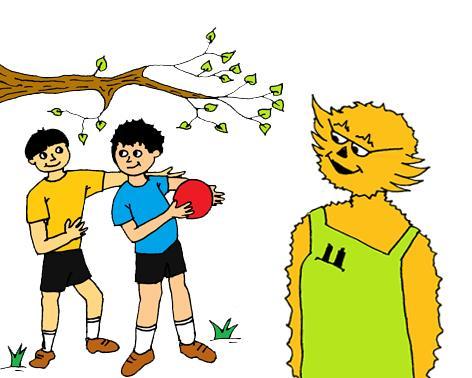
Now, Lee has the ball. Lee has the ball, and Tom is trying to take the ball from Lee. That is what this game is. All the children try to get the ball. The teacher is in the garden, too. “Be careful!” she says. “When you play that game, please try to be careful.”
現在李拿到了球,李拿到了球而湯姆正試著把球搶過來。這就是他們玩的遊戲,所有孩子們都要儘量拿到球。老師也在花園裡。“小心點!” 她說,“你們玩遊戲的時候,請儘量小心。”
The teacher likes to see the children playing games in the school garden, but she wants them all to be careful. She says, “Children! When you play in the garden, please try to be careful.”
老師喜歡看孩子們在學校花園裡玩遊戲,可她希望他們都小心。她說:“孩子們!你們在花園裡玩的時候,請儘量小心。”
Now, Lee doesn’t want to play the game. He wants to go and play in the trees. The school garden has a lot of trees. Some of the trees in the school garden are very big. It is fun to play in those big trees.
現在,李不想玩遊戲,他想去樹上玩。學校花園裡有很多樹,其中有些樹很大,在這些大樹上玩很有意思。
**********
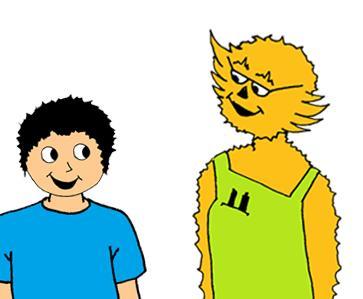
Lee
Excuse me, teacher.
Teacher
Yes, Lee. What do you want?
Lee
Is it all right to go over there?
Teacher
Where? Where do you want to go?
Lee
Over there. In those trees over there. Tom and I want to go and play in those trees.
Teacher
All right. You can go and play in the trees, but please try to be careful.
Lee
Thank you teacher. Thank you very much.
Teacher
And Lee?
Lee
Yes?
Teacher
Please ask your sister to come here. I want to see her. I want to see Pat. I want to see her writing book.
李
打擾您一下,老師。
老師
好的,李。你想要什麼?
李
到那邊去可以嗎?
老師
哪兒?你想去哪兒?
李
那邊,那邊那些樹上。湯姆和我想要去那些樹上玩。
老師
好的,你們可以去那些樹上玩,但一定要小心。
李
謝謝老師,太感謝您了。
老師
李?
李
怎麼了?
老師
請叫你的妹妹過來,我想見她。我想見見佩特,我想看看她的習字本。
**********
Now, the children are not in the garden. They are all in the classroom with the teacher. They are not playing now. They are writing. All the children can write a little now. All the children can write a little, but Pat can write a lot.
現在孩子們不在花園裡,他們和老師一起在教室裡。他們現在沒有在玩,他們在寫字。所有孩子們可以寫一點點東西了。所有孩子們都可以寫一點字,可是佩特會寫很多。
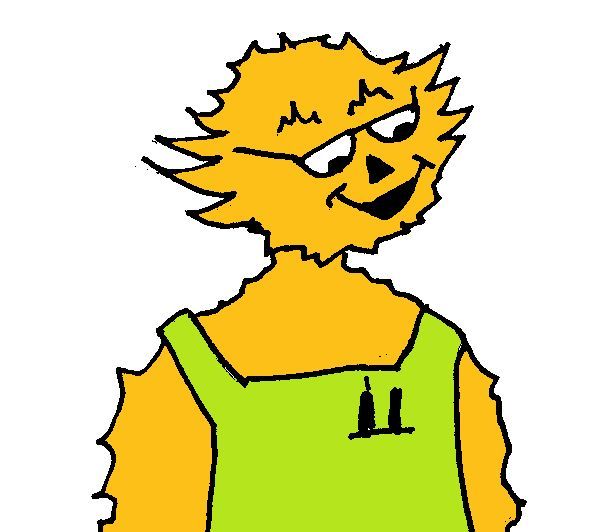
Pat is very good at writing. When Pat writes, she is very careful. She looks at every word she writes. She wants to see that all her words are right. When Pat sees a word that is not right, she makes it right. Pat wants the teacher to see that all of her writing is good.
佩特非常擅長書寫。當佩特書寫的時候,她非常仔細。她看著自己寫的每一個單詞,她想要看到自己把所有單詞都寫正確。佩特看見到寫得不正確的單詞就會改正。佩特希望老師看到她所有單詞都寫得好。。
The teacher says,” Children! When you are writing, please try to be careful. I want you to write very well. I want you to write very well, and I want you to be careful with all the words you write. When I look at your writing books, I want to see that all of your writing is good.”
老師說:“孩子們!你們寫單詞的時候,請儘量仔細。我希望你們好好寫。我希望你們寫得很好,我想要你們仔細寫所有單詞。當我看你們的習字本時,我希望看見你們所有單詞都寫得好。”
**********
Questions
1. Does the teacher want the children to be careful?
2. Are there a lot of trees in the school garden?
3. Who does the teacher want to see?
4. Where are the children writing?
5. Is Pat good at writing now?
6. What does Pat want the teacher to see?
**********
17. Is my English writing good? 我的英語書寫好嗎?
New Words:
English
讀音:[ˈɪŋglɪʃ]
釋義:英語
into
讀音:[ˈɪntə]
釋義:到……裡
**********
Now, Lee and his friend Tom are going into the classroom. The teacher is coming into the classroom, too. “Hello, Lee,” says the teacher. “How are you?” “I am very well, thank you, “says Lee. “How are you?” “I am very well too,” says the teacher.
現在李和他的朋友湯姆要進教室,老師也要進教室。“你好啊,李,” 老師說,“你好嗎?” “我非常好,謝謝。” 李說,“您好嗎?” “我也很好。” 老師說。
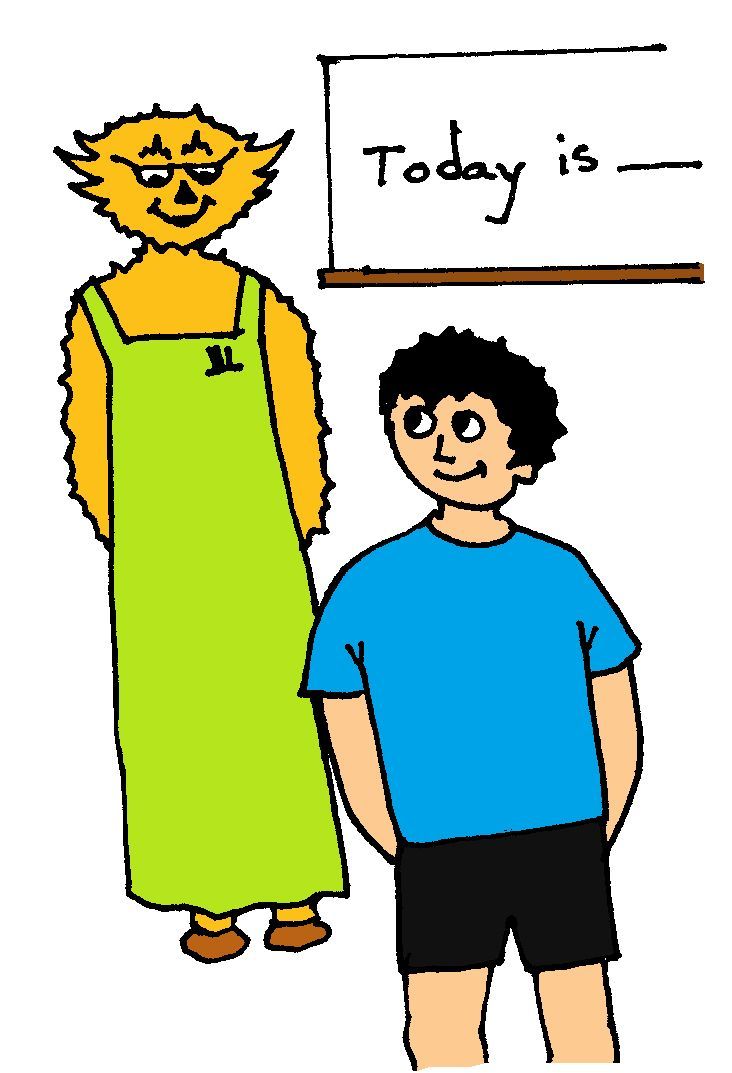
“Please sit down children,” says the teacher. “Please sit down and put your books on the table. Put your pens and pencils on the table, too. Now, please go to a new page in your writing book. I want you to write something for me.”
“孩子們,請坐下。” 老師說。“請坐下來,把書放在桌子上。把鋼筆和鉛筆也放在桌子上。現在把習字本翻到新的一頁。我想讓你們給我寫點東西。”
The children all sit down and look at the teacher. “Please write down these new English words,” says the teacher. “When you write down these new English words, please try to be careful. I want to look at your books and see that your writing is good.”
孩子們全都坐下來看著老師。“請把這幾個英語新單詞寫下來,” 老師說,“在你們寫這幾個英語生詞的時候,請儘量仔細。我希望在看你們的習字本的時候,能看到你們的單詞都寫得好。”
**********
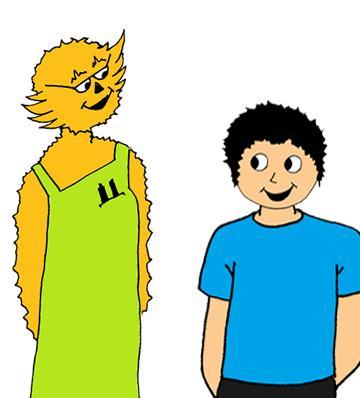
Teacher
Lee, would you give me your writing book please?
Lee
Yes. Here you are. Here is my writing book.
Teacher
Where is your new writing? Is it on this page here?
Lee
No, it isn’t. It’s on that page there.
Teacher
I see. Yes, here it is.
Lee
Is it all right? Is my English writing good?
Teacher
No. Some of your writing is not very good, Lee. Look here.
Lee
Where?
Teacher
Here. Look at these words. These words are not right, are they? When you write down new words, I want you to be careful, Lee. Can you try to be careful when you write?
老師
李,能不能請你把習字本給我?
李
好的,給您。這是我的習字本。
老師
你新寫的單詞在哪裡?是在這一頁上嗎?
李
不是,在那一頁上。
老師
我知道了。好的,在這兒呢。
李
還好嗎?我的英語書寫好嗎?
老師
不,有一些寫得不太好。李,看這裡。
李
哪兒?
老師
這裡,看這些詞。這些詞寫得不對,是不是?在你寫新單詞的時候,我希望你仔細一些,李。你能不能試著在寫字的時候仔細一點呢?
**********
“Children, please look at me,” says the teacher. “I want your English to be good. I want your English to be very good. Please do something for me. Look at the new words I am writing. Please write all the new words in your writing books. Please write them now, and please try to be careful.”
“孩子們,請看著我,” 老師說,“我希望你們的英語都好,我希望你們的英語都很好。請幫我做件事。看我正在寫的這些生詞,請把這些新單詞都寫在你們的習字本里。現在就開始寫,請儘量仔細寫。”

“Those are a lot of new words you are writing,” says Lee. “Yes,” says the teacher. “There are a lot of new words, but please try to write them all down. Please try to write down all the new words and please try to be careful. I want you to write very well. Can you do that? Please try.”
“您寫的新單詞可不少,” 李說。“對,” 老師說,“這兒有很多新單詞,請儘量把它們都寫下來。請把這些新單詞都寫下來,請儘量仔細寫。我希望你們都寫得很好。能做到嗎?請試試看吧。”
“I can try,” says Lee. “I can try to write down all the new words. I know you want our English writing to be good, and I will try to be careful with my English writing.”
“我可以試試,” 李說,“我可以試著寫下那些新單詞。我明白您希望我們寫好英語,我會盡量認真地寫英語。”
Now, all the children are writing the new words in their books. Some of the children are writing with pencils, and some of them are writing with pens. The teaching is looking at the children write. She wants to see the children be careful when they write. She wants the children’s English writing to be very good.
現在所有孩子們都在他們的本子上寫新單詞。有些孩子在用鉛筆寫,有些孩子在用鋼筆寫。老師看著所有孩子們寫字,她想看到所有孩子們在寫字的時候都仔細地寫。她希望所有孩子的英語都寫得很好。
**********
Questions
1. Is the teacher very well today?
2. What does the teacher want the children to do?
3. Does the teacher want the children to be careful when they are writing?
4. What does the teacher want the children to look at?
5. Are there a lot of new words?
6. Can Lee try to be careful?
**********
18. I like boys more than I like girls 比起女孩我更喜歡男孩
New Words:
more
讀音:[mɔː]
釋義:更多
more than
讀音:[mɔː][ðən]
釋義:比……多
**********
Now, Lee and his friend Tom are in the classroom. The two friends are sitting together at their table with the teacher. They are writing some more new words in their books.
現在李和他的朋友湯姆在教室裡,兩個好朋友和老師一起坐在桌子前。他們正在本子上寫更多的新單詞。
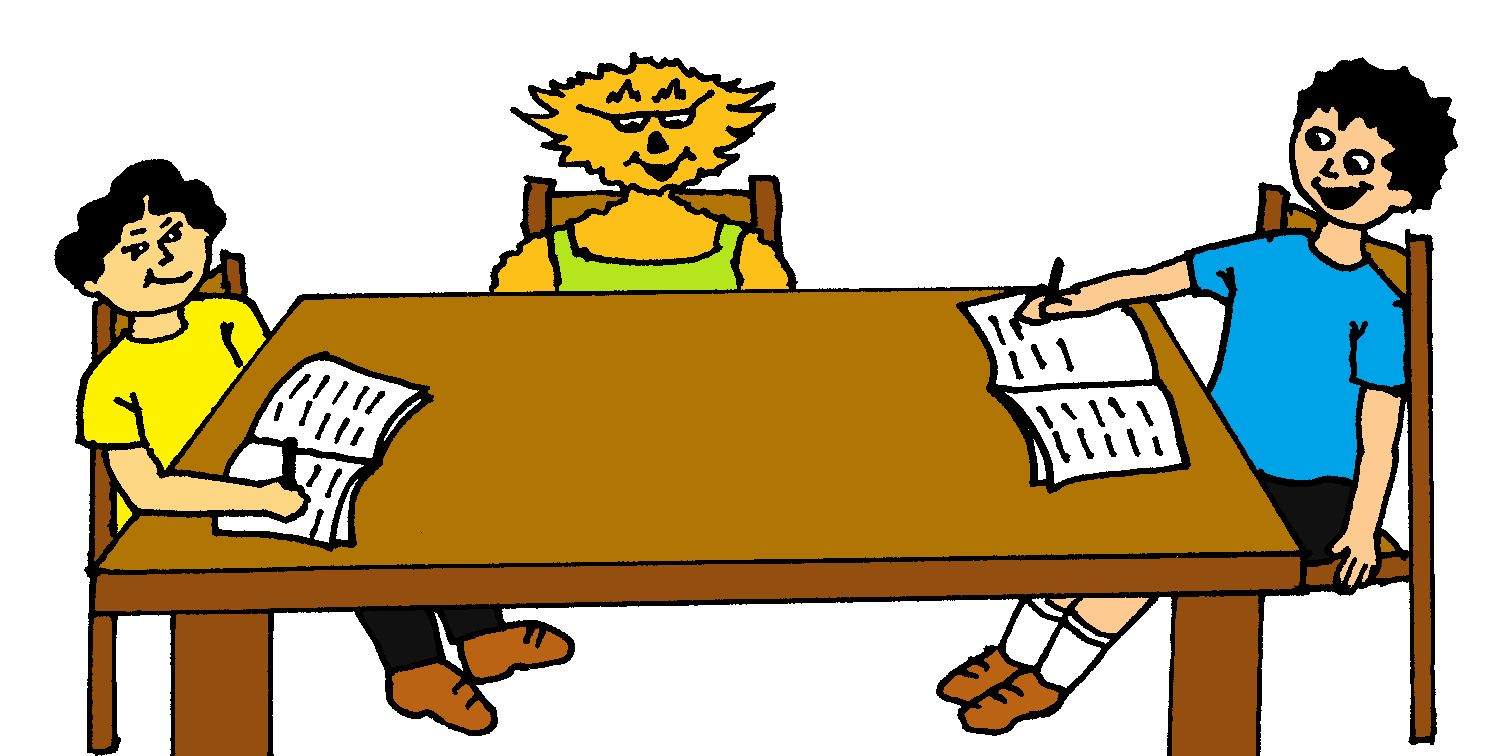
The teacher is looking at the boys’ writing. She is looking at their books. She wants the boys’ writing to be good. She wants them to be good at their English writing. She likes to see the children writing new words.
老師在看男孩們寫的字,她在看他們的習字本。她希望男孩們好好書寫,她希望他們擅長英語書寫。她喜歡看孩子們寫新單詞。
Lee is writing well. He is writing a lot of new words, but Tom is writing more. Tom is writing more than Lee. There are more new words in Tom’s book than in Lee’s book. Tom is writing more new words, but some of his new words are not right.
李寫得好,他在寫很多新單詞,可是湯姆寫得更多,湯姆寫得比李多。和李的習字本比起來,湯姆本子裡的新單詞更多。湯姆在寫更多的新單詞,可是他寫的新單詞中有一些不對。
**********
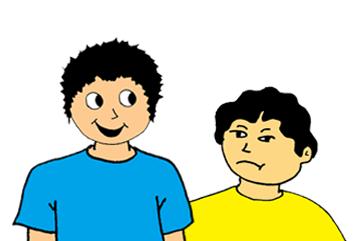
Lee
Are all the words in your book right, Tom?
Tom
No. Some of them are not right. My English writing is not very good today. What about you?
Lee
The teacher says some of my words are not right, too.
Tom
Really? Where?
Lee
Here. On this page. This word and that word are not right. The teacher wants me to write more new words on a new page.
Tom
Yes, she wants me to do that, too. She wants me to write more new words, and she wants me to be more careful with my English.
Lee
The teacher says my sister Pat is much more careful with her English writing than I am. Can I ask you something, Tom?
Tom
Yes. What?
Lee
Do you like my sister more than you like me?
Tom
Your sister? I do like your sister. I like your sister, but I like you more. I like boys more than I like girls, and I really like you. You are my very good friend!
李
你本子裡所有的單詞都是對的嗎,湯姆?
湯姆
不,有一些不對。今天我的英語寫得不太好。你怎麼樣呢?
李
老師說我的單詞中有一些也不對。
湯姆
真的嗎?在哪兒?
李
在這兒呢,在這頁上。這個詞和那個詞不對。老師想讓我在新的一頁上寫更多的新單詞。
湯姆
對,她也讓我這麼做。她想讓我寫更多的新單詞,她想要我更認真地學英語。
李
老師說我妹妹佩特在學英語時比我仔細多了。我能問你些事情嗎,湯姆?
湯姆
好啊,什麼事?
李
跟我比起來,你更喜歡我妹妹嗎?
湯姆
你妹妹?我是挺喜歡你妹妹。我喜歡你妹妹,可是我更喜歡你。比起女孩我更喜歡男孩,我真的很喜歡你。你是我非常好的朋友!
**********
Now, the children are not writing. They are not in the classroom now. They are going into the school garden. It is time to play and all the children are going into the school garden to play.
現在孩子們沒有在寫字。他們現在不在教室裡,他們去學校花園裡。玩耍的時間到了,所有孩子們都去學校花園裡玩。

“Can we take our writing books into the garden?” asks Tom. “Yes, you can,” says the teacher. “You can take your books into the garden but please be careful. Put your books on the table in the garden.”
“我們能把習字本帶進花園裡嗎?” 湯姆問。“可以,” 老師說,“你們可以把習字本帶進花園,但是要小心。把你們的本子放在花園裡的桌子上。”
Now, Lee and Tom are playing together in the garden. Tom gets a ball and gives it to Lee. “This is your ball,” he says. “Yes, you are right,” says Lee. “This is my ball. Let’s play with my ball. Now, I have the ball. You try and take the ball from me.”
現在李和湯姆在花園裡一起玩。湯姆拿到了一個球,給了李,“這是你的球。” 他說。“是,你是對的,” 李說,“這是我的球,我們用我的球玩吧。現在我拿著球,你試著把球從我這裡搶走。”
Now, Tom is trying to take the ball from Lee. He is trying to take the ball, but he can’t. Lee is very good at this game. He can play this game very well. Tom can’t take the ball from Lee, but he is very happy. He is very happy to play with his new friend, Lee.
現在湯姆正試著從李那裡把球搶來。他試著搶球,但是沒有搶到。李非常擅長玩這個遊戲。他玩這個遊戲可以玩得很好。湯姆不能從李那裡搶過球,但他很開心。和他的新朋友李玩,他很開心。
**********
Questions
1. Is Tom writing more than Lee, or is Lee writing more than Tom?
2. Are all of Tom’s new words right?
3. What does the teacher want Lee to do?
4. Who is more careful with their English writing – Lee or Pat?
5. Does Tom like Pat more than he likes Lee?
6. Can the children take their books into the school garden?
**********
19. I think there are more balls in there 我想那裡還有很多球
New Words:
easy
讀音:[ˈiːzɪ]
釋義:容易的
think
讀音:[θɪŋk]
釋義:想,認為,以為
**********
Can you see Lee and Tom? They are in the school garden playing with something. They are playing a game with Lee’s ball. The boys like to play this game. It is a very easy game to play.
你能看到李和湯姆嗎?他們在學校花園裡玩什麼,他們在用李的球玩遊戲。男孩們喜歡玩這個遊戲,這是個很簡單的遊戲。
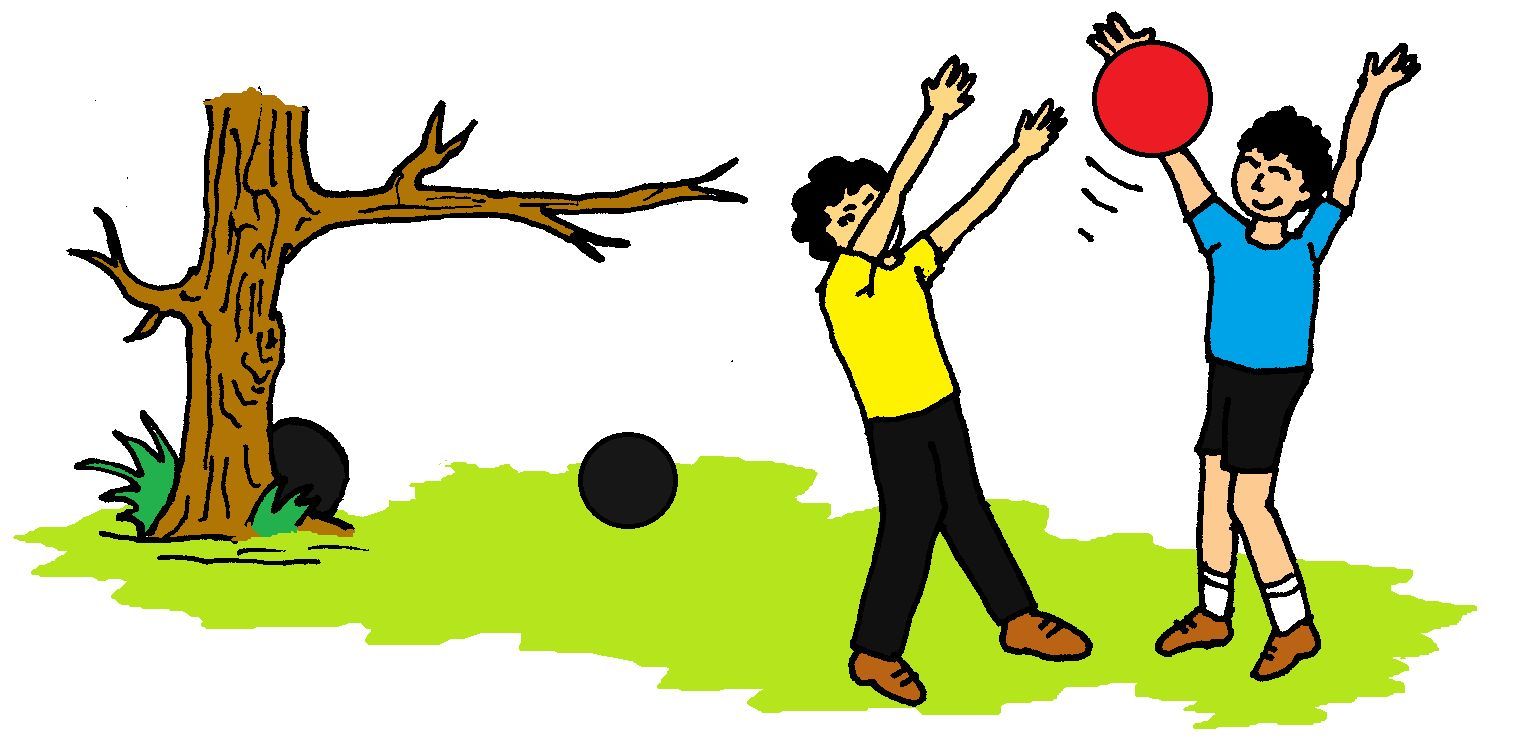
There are a lot of balls in the school garden today. How many balls can you see? Some of the balls are big, and some of the balls are small. One of the balls is red, and two of them are black. The boys are playing with Lee’s red ball. Lee and Tom think this is a good game. They think it is an easy game, too.
今天學校花園裡有很多球。你能看到多少個球?其中有些球大,有些球小。其中有一個球是紅色的,有兩個是黑色的。男孩們在玩李的紅球。李和湯姆覺得這是個好遊戲,他們也認為這是個簡單的遊戲。
Not all the games the boys play are easy, but this one is. It is easy to know what to try to do in the game. In this game, Lee has the ball and Tom is trying to take it from him. It’s not easy for Tom to take the ball from Lee. Lee doesn’t want to let Tom take the ball from him.
並不是男孩們玩的所有遊戲都很簡單,但是這個遊戲很簡單。很容易知道在遊戲裡應該嘗試做些什麼。這個遊戲裡,李拿著球,湯姆要試著從李手裡拿走球。湯姆把球從李那裡拿過來並不容易,李不想讓湯姆拿走球。
**********
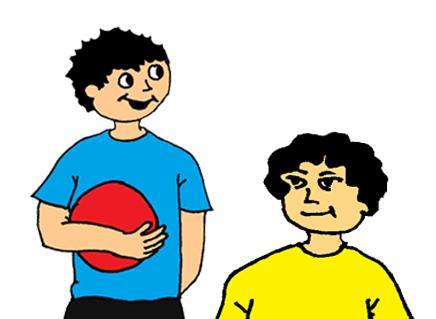
Lee
Do you like this game, Tom?
Tom
Yes, I do. I like to play this game. It’s easy to know what to do in this game.
Lee
Yes it is, isn’t it? Let’s go and get some more balls to play with.
Tom
All right, let’s do that. Do you know where we can get some more balls?
Lee
I think there are some over there. Let’s go and look.
Tom
All right. Let’s go and look.
Lee
I think those balls are the girls’ balls.
Tom
Yes, I think they are. We can’t take those, can we?
Lee
No, I don’t think we can. We can’t take the girls’ balls. I know - let’s go and look in the classroom. I think there are some more balls in there.
Tom
All right. Let’s go and look.
李
湯姆,你喜歡這個遊戲嗎?
湯姆
是的,我喜歡,我喜歡玩這個遊戲。很容易知道在這個遊戲中應該做什麼。
李
對,是這樣的,是嗎?我們去多拿些球來玩。
湯姆
好的,走吧。你知道在哪能再拿些球嗎?
李
我覺得那邊會有,一起去看看。
湯姆
好吧,一起去看看。
李
我覺得這些球是女孩們的。
湯姆
是啊,我覺得是。我們不能拿這些,對吧?
李
是的,我覺得我們不能拿,我們不能拿女孩們的球。我知道了,我們去教室看看,我想那裡還有更多球。
湯姆
好吧,一起去看看。
**********
Now the teacher is coming. She is coming to see Tom. She wants to ask him something. “Come here, Tom,” she says. “Where is Lee?” asks the teacher. “Do you know?” “I think he is in the classroom,” says Tom.
老師來了,她來看湯姆,她想問他點事。“過來,湯姆。” 她說。“李在哪?” 老師問,“你知道嗎?” “我想他在教室裡。” 湯姆說。
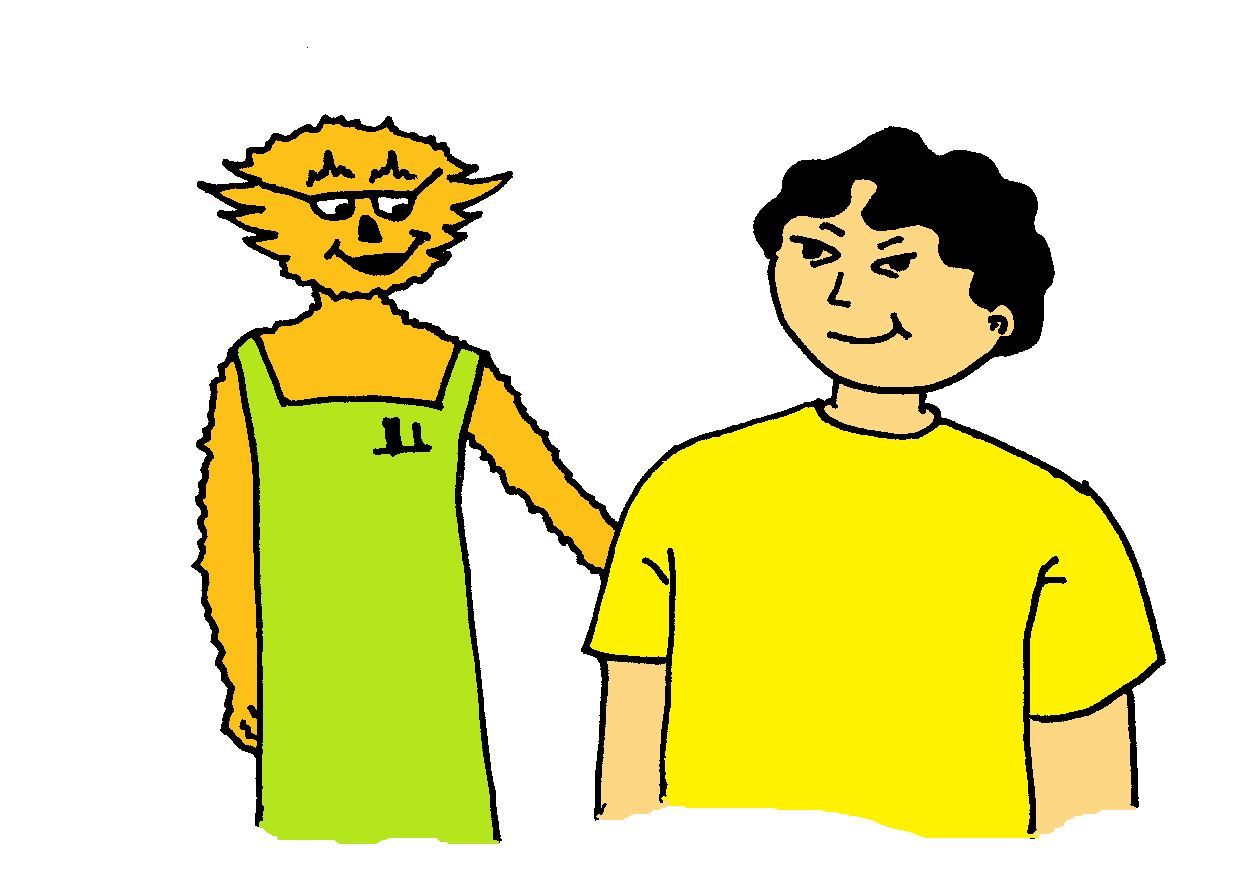
“What do you want him for?” asks Tom. “I want to ask him to do something for me,” says the teacher. “Please go into the classroom and ask him to come and see me. Do you think you can do that?” “Yes, I can,” says Tom. “It’s easy.”
“您找他有什麼事嗎?” 湯姆問。“我想讓他幫我做點事,” 老師說,“請去教室叫他來見我。你能幫我叫他嗎?” “是的,我能,” 湯姆說,“這很容易。”
Tom goes into the classroom to get Lee. He doesn’t know what the teacher wants Lee to do, but he will go and get his friend to come and see her. Tom knows this teacher very well now. He knows she is a very good teacher. She is a very good teacher, and she is good to all the children in her classroom. All the children like this teacher.
湯姆進教室找李,他不知道老師找李幹什麼,但他會去找到他的朋友李讓李去見老師。湯姆現在很瞭解這位老師,他知道她是為很好的老師。她是個好老師,她對班上的所有孩子們都很好。所有孩子們都喜歡這位老師。
**********
Questions
1. Where are Lee and Tom playing?
2. Is the boys’ game easy?
3. Can Lee and Tom take the girls’ balls?
4. Where can Lee go and look for some more balls?
5. Who does the teacher want to see?
6. Does Tom know what the teacher wants Lee to do?
**********
20. Some new words are difficult for me to read 對我來說有些生詞難讀
New Words:
difficult
讀音:[ˈdɪfɪkəlt]
釋義:困難的,不易解決的
yet
讀音:[jet]
釋義:還(沒),尚(未)
**********
Now, all the children are going into the classroom. “Hello children,” says the teacher. “Sit down please. Sit down and look at me. Is Tom here yet?” “Not yet,” says Lee. “He’s in the garden. I think he’s coming now.”
現在所有孩子們都走進教室。“孩子們好,” 老師說,“請坐,坐下,看著我。湯姆到這裡了嗎?” “還沒,” 李說,“他在花園裡,我想他現在正過來呢。”
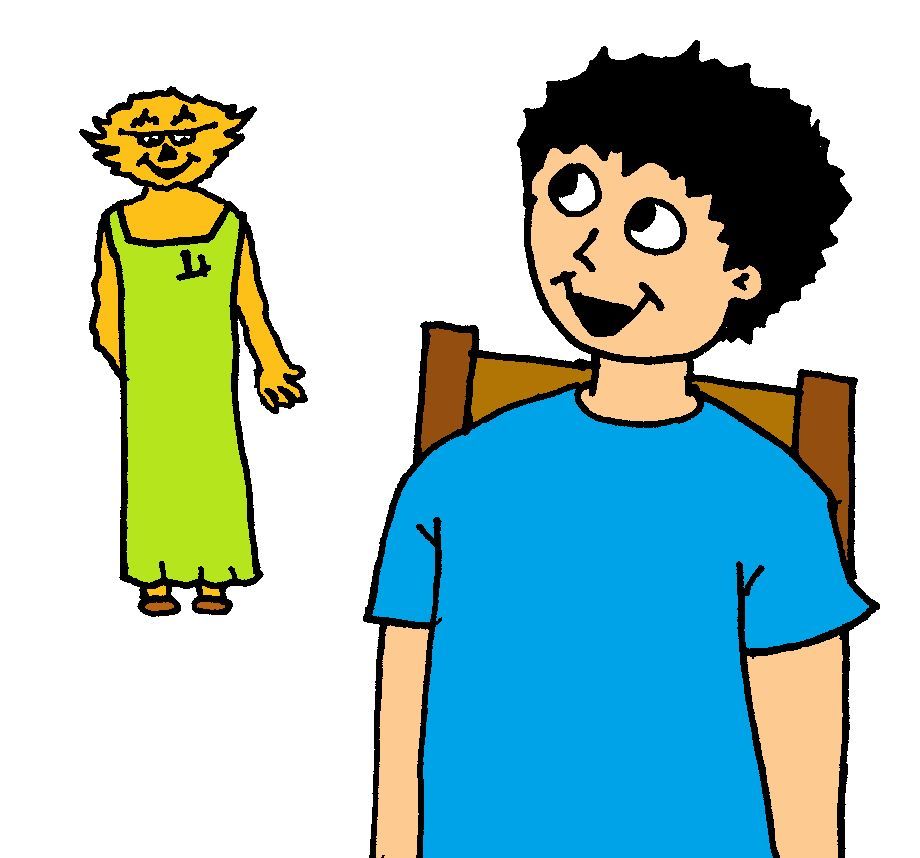
“All right,” says the teacher. “Please look at page two in your English books. Try to read all of that page. When you see a word or something you can’t read, you can ask me. When you think you know all the new words on that page, try to write that page into a page in your writing books.”
“好,” 老師說,“看英語書第二頁,試著讀那頁上的所有內容。遇到不會讀的單詞,你們可以問我。等你們覺得那頁上的生詞都認識了,就試著在習字本上把那頁上的生詞都寫了。”
“Lee, can you see some words that are new or difficult for you?” asks the teacher. “Yes, I can,” says Lee. “Not all of the words on this page are new or difficult for me, but there are some words I don’t know yet. I think some of the new words are difficult.” “That’s all right. You can ask me about the new words you think are difficult,” says the teacher.
“李,你可以找到生詞或難詞嗎?” 老師問。“可以,” 李說,“這頁上不是所有的單詞詞對我來說都是生詞或難詞,但有些單詞我還不認識。我覺得有些生詞有難度。” “沒關係,你可以問我你覺得有難度的生詞。” 老師說。
**********
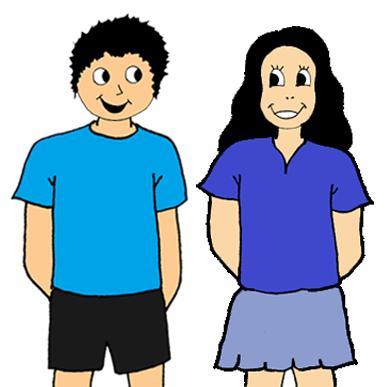
Lee
Do you know all of the new words on this page, Pat? Can you read them all?
Pat
I know some of them, but I don’t know all of them yet.
Lee
I think your English is very good now. I think you know it very well. You know much more than me. I think reading is easy for you now.
Pat
It’s not very easy, and I am not very good at reading yet. Some new words are difficult for me to read. I don’t know all the new words yet.
Lee
Really? I know some of the new words on this page, but my friend Tom knows more than me. Tom is very good at English now.
Pat
Is he? I don’t think your friend Tom knows very much. I don’t think he knows as much as me or my friends.
Lee
I do. I think Tom knows more than you, and I think he knows more than all your friends, too.
Pat
No, he doesn’t!
Lee
Yes, he does!
Pat
No, he doesn’t!
李
佩特,你認識這頁上的所有新單詞嗎?能把它們都讀出來嗎?
佩特
我認識一些,我還沒認識全部。
李
我覺得你的英語現在很好,我覺得你很懂英語。你懂得比我多。我想現在閱讀對你來說很簡單吧。
佩特
並不簡單,我還不是很擅長閱讀。對我來說有些生詞難讀,我還不認識所有生詞。
李
真的嗎?這頁上我認識一些生詞,可我的朋友湯姆比我懂得多。湯姆現在很擅長英語了。
佩特
是嗎?我不覺得你的朋友湯姆懂得多。我覺得他不比我或我的朋友們懂得多。
李
我認為湯姆比你懂得多,也比你所有的朋友們懂得多。
佩特
不,他沒有!
李
不,他有。
佩特
不,他沒有!
**********
Look at Pat. Can you see Pat? Pat is in the classroom. Is she reading or writing? She is writing. She is writing a lot of new words in her writing book. Pat can write English very well now. She is good at writing.
看佩特,你能看見佩特嗎?佩特在教室裡。她在看書還是寫字?她在寫字。她在習字本上寫很多新單詞。佩特現在能很好地書寫英語,她很擅長書寫。
Pat thinks reading and writing is not very difficult. “I like to write.” says Pat. “I like to write and my friends like to write, too. We all like to write. We can’t write very well yet. Some of it is a little difficult, but we all like to write.”
佩特認為閱讀和寫字並不是很難。“我喜歡寫字,” 佩特說,“我喜歡寫字,我的朋友也喜歡寫字。我們都喜歡寫字,我們還不能寫得很好。有些有點難,但我們都喜歡寫。”
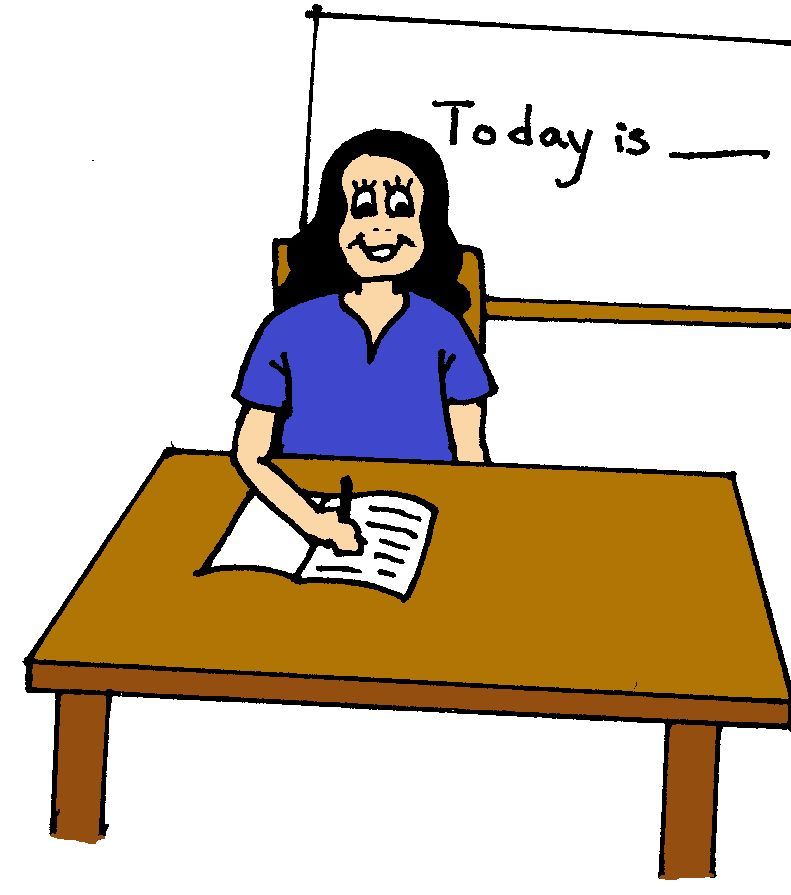
Where is Lee’s friend now? Where is Tom? Tom is not in the classroom yet. He is in the school garden playing with Kim the dog. Tom doesn’t want to come in the classroom yet. He wants to play in the garden with Kim. He doesn’t want to read and write English now. He wants to play in the garden with Kim.
李的朋友現在在哪?湯姆在哪?湯姆不在教室,他和那條小狗金在學校花園玩。湯姆還不想進教室,他想和金在花園玩。他現在不想讀寫英語,他想和金在花園裡玩。
The teacher is not happy. She is not happy with Tom. The teacher wants Tom to come into the classroom. She wants him to come into the classroom, sit down and look at his reading book.
老師不高興,她對湯姆不滿意。老師想讓湯姆進教室,她想讓他進教室坐下看閱讀書。
**********
Questions
1. Is Tom in the classroom yet?
2. Where is he?
3. Are some of the new words difficult for Lee?
4. Can Lee ask the teacher about the new words?
5. Who is good at writing – Pat or Lee?
6. Does Tom want to come in the classroom?
**********
21. It’s not lunchtime yet 還沒到午餐時間
New Words:
lunch
讀音:[lʌntʃ]
釋義:午餐
let
讀音:[let]
釋義:允許,讓
**********
The teacher wants to ask Lee something. She goes over to Lee and says, “Lee, can you write something about your mommy and daddy?” “Yes I can,” says Lee. “I can write something about them, but I don’t know that all my writing is good yet. Some of my writing is not very good, but let me try.”
老師想問李一些事情,她走到李那裡說:“李,你能寫有關你媽媽和爸爸的事情嗎?” “可以,” 李說,“我可以寫關於他們的事情,可是我不知道我的所有書寫是否都正確。我的有些書寫不是很好,但讓我試試吧。”
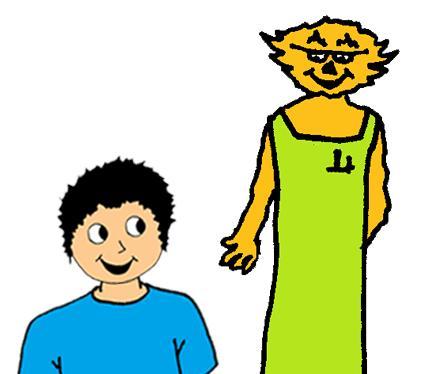
“Yes, please try,” says the teacher. Please try and write a little about your mommy and daddy. I know some of the new words are difficult for you, but please try. I can look at your writing book. I can look and see what is right and what is not right.”
“好的,請試試吧,” 老師說,“請嘗試寫一點關於你的媽媽和爸爸的事情。我知道有些生詞對你來說有難度,但是請嘗試一下吧。我可以看你的習字本,我可以看出哪些是對的,哪些不對。”
Lee does not know how to write all the words he wants to write in his English writing book. When he does not know how to write a word, he can ask the teacher. He can ask the teacher or he can ask his sister, Pat. Pat is very good at writing now. She can let Lee look at her book. When Lee looks at Pat’s book, he can see how to write a lot of the new words.
對於要在習字本上寫的單詞,並不是所有的單詞李都知道如何寫。他不知道如何寫單詞時就可以問老師,他可以問老師或問妹妹佩特。佩特現在很擅長書寫,她可以讓李看她的書。當李看佩特的書時,他可以看到如何書寫很多新單詞。
**********

Teacher
Lee, come here please. Let me see your writing book.
Lee
Here you are. Here is my English writing book.
Teacher
Thank you. Look at this word, Lee. Do you think this word is right?
Lee
What word? Where?
Teacher
This word. Here.
Lee
I don’t know. Is it right or not? That word is difficult for me.
Teacher
It’s not right, Lee. Here, let me write it for you. This is how to write this word. It’s really not very difficult, is it?
Lee
No, it isn’t. When you write it, it’s not very difficult. Thank you.
Teacher
That’s all right, Lee. I want you to be good at English.
Lee
Thank you. My English is not very good yet, is it?
Teacher
No, it isn’t Lee. Not yet.
老師
李,請到這裡來,讓我看看你的習字本。
李
給您,這是我的英語習字本。
老師
謝謝。李,看這個詞,你覺得這個詞是對的嗎?
李
哪個?在哪?
老師
這個詞,這裡。
李
我不知道。是對的,還是錯的?那個詞對我來講有些難。
老師
不對,李。這裡,我寫給你看。這個詞這樣寫,並不是很難,對吧?
李
是的,不難,看您寫並不是很難。謝謝。
老師
沒關係,李。我希望你能掌握好英語。
李
謝謝。我的英語還不好,對吧。
老師
是的,不太好,還不太好。
**********
Now, the children are hungry. Lee is hungry. Pat is hungry and Tom is very hungry. The children are not looking at their books now. They are not reading or writing. They want to go and have lunch.
現在孩子們餓了,李餓了,佩特餓了,而湯姆很餓。孩子們現在沒看書,他們沒讀書或寫字,他們想要去吃午餐。

“Can you let us go for our lunch now?” Tom asks the teacher. “I am very hungry.” “No, I cannot let you go yet,” says the teacher. “I cannot let you go for lunch yet. It is not time for lunch yet.”
“能讓我們現在去吃午餐嗎?” 湯姆問老師,“我特別餓。” “不,我還不能讓你們走,” 老師說,“我還不能讓你們去吃午餐,還沒到吃午餐的時間。”
“She is right,” says Pat. “It is not time for lunch yet. We can only go for lunch when it is the right time. It is not lunchtime yet. When it’s the right time, when it is lunchtime, the teacher will let us go.”
“她說的對,” 佩特說,“還沒到吃午餐的時間。我們只能在午餐時間去吃午餐,還沒到午餐時間。到了時間,到了午餐時間,老師會讓我們去的。”
“But I am very hungry,” says Tom. “I want to eat lunch now.” “I’m sorry, you can’t,” says the teacher. “It’s not time yet. I know you are very hungry now Tom, but I can’t let you go and eat lunch yet. It’s not the right time yet.”
“但是我特別餓,” 湯姆說,“我想現在吃午餐。” “抱歉,你不能去,” 老師說,“還沒到時間。湯姆,我知道你現在非常餓,但是我不能讓你去吃午餐。還沒到時間。”
**********
Questions
1. What does the teacher want Lee to write about?
2. When Lee doesn’t know how to write a word, who can he ask?
3. Are some of the new words difficult for Lee?
4. Who is very hungry today?
5. Is it time for lunch yet?
6. When can the children go for lunch?
**********
22. How much meat is there? 有多少肉?
New Words:
ready
讀音:[ˈredɪ]
釋義:就緒的,準備好的
How much… ?
讀音:[hau] [mʌtʃ]
釋義:……多少?
**********
Now, it is lunchtime in the children’s school. It is time to eat lunch, and lunch is ready now. Lunch is ready, and the teacher is getting it for the children. The children go into the room with the teacher and sit down at their tables. All the children are ready to eat. All the children are ready to eat lunch, and Tom is really ready to eat lunch!
現在是孩子們學校裡的午餐時間。現在是吃午餐的時間,午餐已經準備好了。午餐已經準備好,老師正在為孩子們取餐。孩子們和老師一起進入房間,然後坐到桌子前。所有孩子們都準備好開始吃飯了。所有孩子們都已經準備好吃午餐了,湯姆真的準備好吃午餐了!
The teacher is putting lunch on the children’s tables. Pat is hungry, Lee is hungry and the teacher is hungry, too. What about Tom? We know Tom, don’t we? Tom is very, very hungry. The children look at all the food the teacher is putting on their table. The food looks very good today.
老師在將午餐放到孩子們的桌上。佩特餓了,李餓了,老師也餓了。湯姆呢?我們都認識湯姆,不是嗎?湯姆非常非常餓了。孩子們看著老師放在他們桌子上的所有食物,今天的食物看起來很好吃。
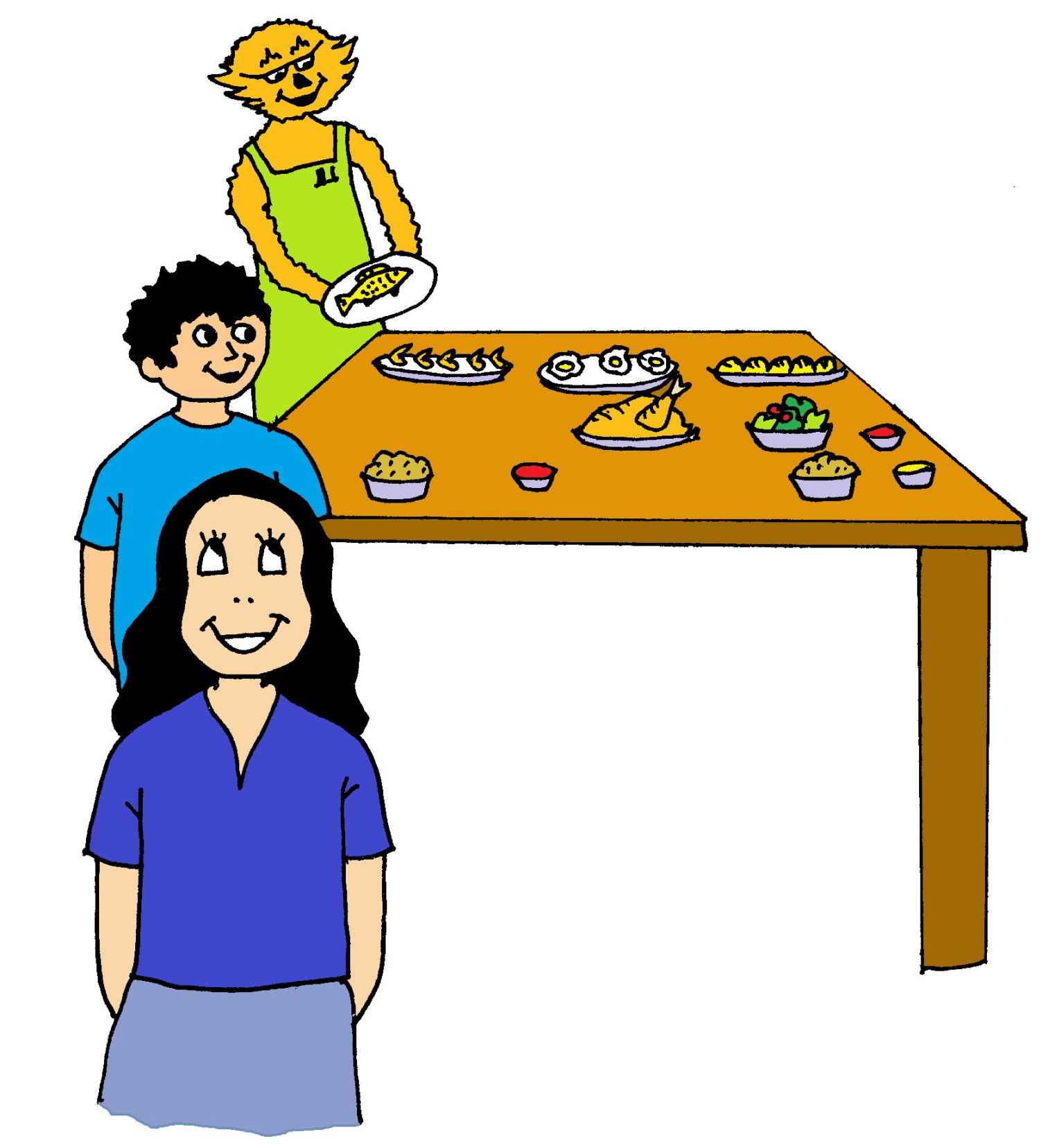
Can you see all the food on the table? How much food is there? How much food can you see? A lot! There is a lot of food for lunch today. The children are very happy to see that there is a lot of food for lunch today. Lee and Pat are very happy, and Tom is very, very happy!
你能看到桌子上的所有食物嗎?那兒有多少食物?你能看到多少食物?很多!今天的午餐有很多食物,孩子們很高興看到今天的午餐有很多食物。李和佩特很高興,湯姆非常非常高興!
**********

Tom
What time is it? Is it lunchtime yet?
Lee
Yes, I think it’s lunchtime now.
Tom
Is lunch ready?
Lee
Yes, it is. Look. The teacher is putting the food on the tables now.
Tom
Good! I’m really hungry, and I’m really ready to eat!
Lee
You are very hungry every day. You are ready to eat all the time!
Tom
That’s right. I really like to eat. I eat a lot more than you do.
Lee
I know. You eat a lot more than all the children in our school. How much food do you eat every day?
Tom
I don’t know how much I eat, but I do know that I eat a lot. I eat more than my friends at school, I eat more than the teacher, and at home I eat more than my mommy and daddy, too!
湯姆
幾點了?到午餐時間了嗎?
李
是的,我想現在到午餐時間了。
湯姆
午餐準備好了嗎?
李
準備好了。看。老師正在將食物放到桌子上。
湯姆
太好了!我真的很餓了,我真的準備好吃飯了!
李
你每天都很餓,你隨時都準備好吃飯了!
湯姆
是的,我真的很喜歡吃。我比你們都吃得多。
李
我知道,你比我們學校所有的小朋友都吃得多。你每天要吃多少食物啊?
湯姆
我不知道我要吃多少,但我知道我能吃很多。我比學校裡的朋友們吃得多,我比老師吃得多,在家裡我也比我爸爸媽媽吃得多!
**********
Lunch is on the tables now, and the children are ready to eat. There is some rice for lunch, and there are some eggs and fish, too. There is some meat for lunch today, too.
現在午餐已經擺上桌,孩子們準備好用餐。午餐有米飯,有雞蛋,還有魚。今天午餐還有肉。
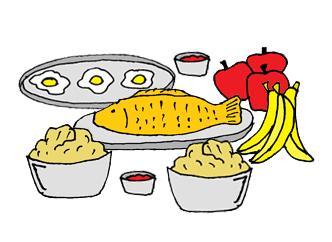
“How much rice is there?” asks Tom. “There is a lot of rice,” says Lee. “What about eggs?” asks Tom. “How many eggs are there?” “A lot,” says Lee. “There are a lot of eggs today.” “What about meat?” asks Tom. “How much meat is there?” “I think there is only a little meat today,” says Lee.
“有多少米飯啊?” 湯姆問。“有很多米飯。” 李說。“雞蛋呢?” 湯姆問。“有多少個雞蛋?” “有很多,” 李說,“今天有很多雞蛋。” “肉呢?” 湯姆問,“有多少肉?” “我想今天只有一點兒肉。” 李說。
Today, there are some bananas and apples for lunch, too. “How many bananas are there?” asks Tom. “There are a lot,” says Lee. “There are a lot of apples, too. There is a lot of food for lunch today.” “Good!” says Tom. That’s good. I am really, really hungry today!”
今天的午餐還有一些香蕉和蘋果。“有多少香蕉?” 湯姆問。“有很多,” 李說,“還有很多蘋果,今天的午餐有很多食物。” “太好了!” 湯姆說,“太好了,我今天真的非常餓了!”
**********
Questions
1. Is lunch ready yet?
2. Who is very, very hungry?
3. Are there some eggs for lunch today?
4. Are there some oranges?
5. How much rice is there?
6. How many eggs are there?
**********
23. Do you have enough rice? 你的米飯夠了嗎?
New Word:
enough
讀音:[ɪˈnʌf]
釋義:足夠的
**********
The teacher is getting the food for the children. She is putting all the food on the tables. There is a lot of food for lunch today. Lunch today looks very good. There is some rice and there are some eggs. There is some fish and there is a little meat. There are some apples and some bananas, too.
老師正在為孩子們準備食物,她將所有食物放到桌子上。今天的午餐有很多食物,今天的午餐看起來非常不錯。有一些米飯、還有一些雞蛋。有一些魚,還有一點肉。另外還有蘋果和香蕉。
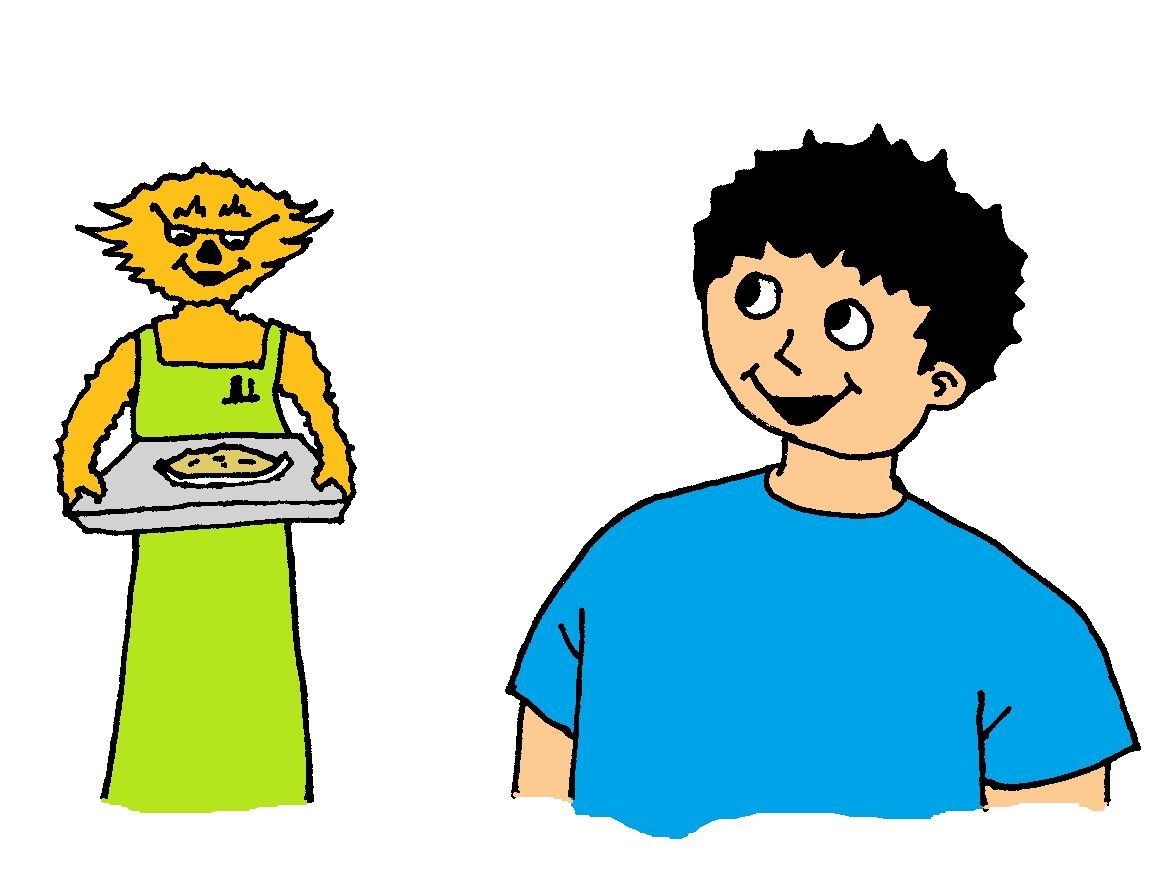
“Would you like some meat, Tom? Can I give you a little meat?” asks the teacher. “Yes, please,” says Tom. “But please give me a lot of meat. I really like meat!” Here you are,” says the teacher. “Here is some meat for you. Is that enough for you now?”
“想要吃點肉嗎,湯姆?給你一點肉好嗎?” 老師問。“好的,謝謝,” 湯姆說,“但請多給我點肉,我真的很喜歡吃肉!” “給你,” 老師說,“給你些肉,現在夠了嗎?”
“Can you give me a little more?” asks Tom. “I’m very hungry today.” “All right,” says the teacher. “Here is some more meat for a boy who is very hungry today.”
“可以再給我一點嗎?” 湯姆問,“我今天很餓。” “好的,” 老師說,“今天給很餓的男孩多點肉。”
“What about you, Lee?” asks the teacher. “Would you like some more meat, too?” “No thank you, “says Lee. “I have enough meat now, but I would like a little more rice, please.” “Here you are,” says the teacher. “Here is some more rice for you. Is that enough?” Yes, thank you,” says Lee. “That is enough now.”
“你呢,李?” 老師問,“你也想要多一點肉嗎?” “不用了,謝謝,” 李說,“我的肉夠吃了,但我想要多一點米飯,謝謝。” “給你,” 老師說,“再給你多一些米飯,夠了嗎?” “夠了,謝謝,” 李說,“現在夠了。”
**********

Teacher
Do you have enough rice, Tom? Would you like some more?
Tom
Yes, I would. Thank you.
Teacher
Here you are. Let me get it for you. How much more would you like… a lot or a little?
Tom
A lot, please. Please give me a lot more rice. I’m very hungry today.
Teacher
You are very hungry every day, Tom. You are hungry all the time. There you are. Is that enough for you now?
Tom
Yes, that is enough. Thank you. Thank you very much.
Teacher
And what would you like to drink?
Tom
I would like some orange-juice, please.
Teacher
Here you are. Here is some orange-juice for you. Is that enough orange-juice?
Tom
Yes, it is. Thank you. Thank you very much.
老師
你的米飯夠了嗎,湯姆?還想要一些嗎?
湯姆
好的,謝謝。
老師
給你,我再給你盛點兒。你想要多少……多點還是少點兒?
湯姆
多點,謝謝。請再多給我些米飯,我今天非常餓。
老師
你每天都非常餓,湯姆。你一直都很餓。給你,現在夠了嗎?
湯姆
好了,夠了。謝謝,非常感謝。
老師
你想要喝什麼?
湯姆
我想喝橙汁,謝謝。
老師
給你一些橙汁,橙汁夠了嗎?
湯姆
夠了,謝謝,非常感謝。
**********
“What would you like to drink, Lee?” asks the teacher. “Would you like water, orange-juice or milk?” “Please give me a little water,” says Lee. “I don’t want to drink milk or orange-juice now. I think only Tom wants to drink orange-juice now.”
“你想喝點什麼,李?” 老師問,“你想喝水、橙汁還是牛奶?” “請給我一點水,” 李說,“我現在不想喝牛奶或橙汁,我想只有湯姆現在想喝橙汁。”

“When do you drink milk or orange-juice?” asks the teacher. “I like to drink orange-juice in the mornings at breakfast,” says Lee. “I like to drink orange-juice at breakfast and my sister likes to drink milk at breakfast.” “There you are,” says the teacher. “There is some water for you.”
“那你什麼時候喝牛奶或橙汁呢?” 老師問。“我喜歡在早晨吃早餐的時候喝橙汁。” 李說。“給你,” 老師說,“給你水。”
Now, all the children are eating their school lunch. They are eating lunch with their teacher. This teacher gives all the children their lunch. She wants to see that all the children have enough to eat. When all the children have their food, and it is enough, the teacher sits down and eats her lunch. She is eating her lunch with the children now.
現在學校裡所有孩子們都在吃午餐。他們和老師一起吃午餐。這位老師為所有孩子分派午餐,她希望所有孩子都有足夠的食物可以吃。當所有孩子都領到足夠的午餐後,她才坐下來吃午餐。她現在正和孩子們一起吃午餐。
**********
Questions
1. Does Tom want a little more meat, or does he want a lot more meat?
2. Does the teacher give Lee enough rice?
3. How much more rice would Tom like?
4. What would Tom like to drink?
5. What about Lee?
6. When does Lee like to drink orange-juice?
**********
24. Thank you for letting me come to have dinner 謝謝你讓我來吃晚餐
New Word:
dinner
讀音:[ˈdɪnə]
釋義:晚餐
**********
Now, it is time for the children to go home from school. It is hometime. It is hometime, and all the boys and girls are walking home. Lee is walking with his new friend, Tom. When the children get home, it will be time for dinner. Lee’s new friend is very happy about that.
現在到了孩子們放學回家的時間了,現在是回家的時間。現在是回家的時間,所有男生女生都要走回家。李和他的新朋友湯姆一起走。孩子們到家後就是晚餐時間了。李的新朋友非常喜歡晚餐時間。

Some of the children are looking at a cat. Can you see the cat? It is a big black cat. The cat is in a tree. It wants to play in the tree. Cats really like to go in trees. The children like to see the cat playing in the tree. They think it looks like the cat is having fun in the tree.
有些孩子們在看一隻貓。你能看到貓嗎?它是一隻大黑貓。這隻貓在樹上,它想要在樹上玩。貓很喜歡在樹上玩。孩子們喜歡看貓在樹上玩,他們覺得貓看起來在樹上玩得很開心。
One of the children is trying to get the cat. He is trying to get the cat from the tree. He is trying to get the cat, but he can’t. The cat does not want to come down from the tree.
一個孩子試著去捉那隻貓,他試著把貓從樹上抱下來。他試著去捉那隻貓,但是捉不到,那隻貓不想從樹上下來。
**********

Lee
Would you like to come and have dinner at my house, Tom?
Tom
Yes, I would. I would like that very much. Thank you.
Lee
All right. When we get home, I can ask my mommy to let you have dinner with us.
Tom
Thank you. I really would like to have dinner at your house. Is the food at your house good today?
Lee
Yes, it is. My mommy knows how to make very good food. My daddy can make good food, too. Pat and I really like their food.
Tom
Do they make a lot of food for you to eat? Is there enough?
Lee
Yes, they do. The food is very good and they like to give us more than enough to eat. What about your mommy?
Tom
My mommy?
Lee
Yes. Doesn’t she give you enough to eat?
Tom
She gives us enough, but it’s not very good.
李
你想到我家吃晚餐嗎,湯姆?
湯姆
想啊,我很想去,謝謝。
李
好吧,我回家後會問問我媽媽,讓你和我們一起吃晚餐。
湯姆
謝謝,我真的很想去你家吃晚餐,你們今天的晚餐好吃嗎?
李
好吃,我媽媽知道怎麼做出非常好吃的食物。我爸爸也會做一些。佩特和我都很喜歡他們做的食物。
湯姆
他們會給你們做很多吃的嗎?夠嗎?
李
是啊,他們做的食物都很好吃,他們喜歡讓我們吃得撐不下。你媽媽呢?
湯姆
我媽媽嗎?
李
是啊,她會給你足夠的東西吃嗎?
湯姆
她會給我們做足夠的食物,但是不怎麼好吃。
**********
Lee is taking his friend Tom home to eat dinner at Lee’s house. The boys are very happy. Lee really wants to take his new friend home, and Tom really wants to eat dinner at Lee’s house. Tom really likes to eat. At school, he eats a lot more than Lee. He eats a lot more than Pat, and he eats a lot more than the teacher, too.
李帶著好朋友湯姆去李的家裡吃晚餐,兩個男孩很高興。李真的很想帶新朋友回家,湯姆也真的很想去李的家裡吃晚餐。湯姆真的很喜歡吃。在學校他吃得比李多得多,他比佩特也吃得多很多,比老師也吃的多很多。

The boys are walking to Lee’s house and Tom is asking Lee about dinner. “Thank you for letting me come to have dinner with you,” he says. “That’s all right,” says Lee. “We are happy to let you come and have dinner with us. I think you will really like our mommy’s food. I think you will like it a lot!”
兩個男孩走在去李的家裡的路上,湯姆在問李關於晚餐的問題。“謝謝你讓我來和你們吃晚餐。” 他說。“不用謝,” 李說,“我們很高興你來家裡和我們一起吃晚餐。我想你會喜歡上我媽媽做的食物。我想你會非常喜歡的!”
“What do you think there is for dinner today,” asks Tom. “Do you know?” “No. I don’t.” says Lee. “We can see when we get home. When dinner is ready, we can see what food there is on the table. I know you are very hungry now. I am not very hungry, but I know you are. I don’t want to eat a big dinner today, but I know you do. When we get home, you can eat a big dinner at my house. You can eat a very big dinner with very good food!”
“你覺得今天的晚餐會有什麼呢?” 湯姆問,“你知道嗎?” “不,我不知道。” 李說,“我們到家就能看到了。晚餐準備好之後,我們可以看到桌子上有哪些食物。我知道你現在餓了,我還不是很餓,但我知道你很餓了。等我們到家之後,你可以在我家吃一頓大餐。你可以吃到非常好吃的一頓大餐!”
**********
Questions
1. Who is Lee walking home with?
2. What are some of the children looking at?
3. Would Tom like to have dinner at Lee’s house?
4. Does Lee’s mommy make very good food?
5. Who is not very hungry?
6. When can the boys see what there is for dinner?
25. How much do you read in one day at school? 你們在學校一天讀多少書呢?
New Words:
No new words
**********
Look at Lee’s daddy. Lee’s daddy is in the house with Tom. He wants to get to know Lee’s new friend. “Hello Tom,” says Daddy. “We are happy to have you come and have dinner with us in our house.” “Thank you.” says Tom. I like your house. I like it very much.”
來看看李的爸爸,李的爸爸和湯姆一起在屋子裡,他想要認識李的新朋友。“你好啊,湯姆,” 爸爸說,“很高興你能來我們家吃晚餐。” “謝謝,” 湯姆說,“我喜歡你們的房子,我非常喜歡它。”

“Thank you,” says Daddy. I like it, too. How about your school? Do you like going to school, Tom?” “Yes, I do,” says Tom. “What do you like about your school?” Daddy asks. “I like our teacher. I like reading. I like writing. I like playing with my friends and I really like our school lunches!” says Tom. “Our school lunches are very good!”
“謝謝,” 爸爸說,“我也喜歡它。那你的學校呢?你喜歡去學校嗎?” 爸爸問。“是的,我喜歡。” 湯姆說。“你喜歡你學校的什麼?” 爸爸問。“我喜歡我們的老師,我喜歡讀書,我喜歡寫字,我喜歡和朋友們一起玩,我很喜歡學校的午餐!” 湯姆說,“我們學校的午餐真的很好吃!”
“That’s good to know,” says Daddy. “What about your friend Lee and his sister, Pat? Do they like your school lunches, too?” Daddy asks. “Yes, I think they do,” says Tom. I think all the children in our school like our school lunches. Our school lunches are really, really good!” “Good,” says Daddy. “Now, please go and ask Pat to come and see me. I want to ask her something.”
“很高興知道這個,” 爸爸說,“那你的朋友李和她妹妹佩特怎麼樣呢?他們也喜歡你們學校的午餐嗎?” 爸爸問。“是的,我覺得他們喜歡。” 湯姆說,“我覺得我們學校所有孩子們都喜歡我們學校的午餐。我們學校的午餐真的很好吃!” “那太好了,” 爸爸說,“現在請你去叫佩特來見我。我想問她些事情。”
**********

Pat
Excuse me, Daddy. Do you want to see me?
Daddy
Yes, I do. I want to ask you something. I want to know what you do at school every day.
Pat
I see. Every day, we read and we write English. I really like to read and write. I’m getting good at it now.
Daddy
Are you? What about Lee? Is he getting good at reading and writing, too?
Pat
Not really. Some of the reading and writing is very difficult for Lee.
Daddy
I see. How much do you read in one day at school? How much do you read, and how much do you write?
Pat
Every day, we try to read two pages of English, and we try to write one new page in our writing books.
Daddy
That’s good.
Pat
Thank you. I am really trying, but I don’t think my reading and writing is good enough yet. There are a lot of words I don’t know how to read and write yet.
Daddy
I see. I want you to be good at reading, Pat. I want you to be good at writing, too. I want Lee to be good at reading and writing English, too.
Pat
Yes, Daddy. I am trying. I try every day at school. Lee is trying, too.
佩特
打擾一下,爸爸,您找我嗎?
爸爸
是的,我想問你些事情。我想知道你每天在學校都做些什麼。
佩特
我明白了。我們每天都會讀寫英語,我真的很喜歡讀書和寫字,我現在很擅長這些了。
爸爸
是嗎?那李呢?他也開始擅長讀書和寫字了嗎?
佩特
並沒有,有一些閱讀和書寫對李來講非常難。
爸爸
我知道了。你們在學校一天讀多少書呢?你每天讀多少書,又寫多少字呢?
佩特
每天我們都試著讀兩頁英語,並在習字本里寫一頁。
爸爸
這很好。
佩特
謝謝您。我真的在努力,可是我覺得我的閱讀和寫字還不夠好。還有很多詞我還不知道怎麼讀,怎麼寫呢。
爸爸
我知道了,我希望你擅長閱讀,佩特。我也希望你能擅長寫字。我也希望李能夠擅長讀寫英語。
佩特
好的,爸爸,我正在努力。我每天在學校都有努力,李也在努力。
**********
Now, it is time to eat dinner. It is dinnertime. All the children go into the room with Daddy and sit down at the table together. They are all very hungry. They are all very hungry, but dinner isn’t ready yet. Mommy is getting dinner ready now.
現在到了吃晚餐的時間,現在是晚餐時間。所有孩子們都和爸爸一起進入房間,坐在桌子前,他們都很餓。他們都很餓,但是飯還沒有準備好。媽媽現在正在準備晚餐。

“Is there some ice-cream today?” asks Tom. “No, there is not,” says Daddy. “We don’t eat ice-cream with our dinner. We like to eat ice-cream when it is hot and we like to eat ice-cream when Pat’s friends come to our house. But today we are not eating ice-cream. Sorry, Tom.”
“今天有冰激凌嗎?”湯姆問。“不,沒有。” 爸爸說,“我們晚餐時不吃冰激凌。我們喜歡在天熱的時候吃冰激凌,我們也喜歡在佩特的朋友來到家裡的時候吃冰激凌。但是今天我們不吃冰激凌。抱歉,湯姆。”
“I like to eat ice-cream,” says Tom. I like to eat ice-cream when we have breakfast. I like to eat ice-cream when we have lunch, and I like to eat ice-cream when we have dinner, too. I like to eat ice-cream all the time. I really like ice-cream!”
“我喜歡吃冰激凌,” 湯姆說,“我喜歡在吃早餐的時候吃冰激凌,我喜歡在吃午餐的時候吃冰激凌,我也喜歡在吃晚餐的時候吃冰激凌。任何時候我都喜歡吃冰激凌,我真的很喜歡冰激凌。
**********
Questions
1. Who does Lee’s daddy want to get to know?
2. What does Tom really like about his school?
3. Is Pat getting good at reading and writing English now?
4. How much English do Pat and her friends try to read and write every day?
5. Is dinner ready yet?
6. When does Tom like to eat ice-cream?
**********
26. Would you like a little more meat? 你還想要一點肉嗎?
New Words:
I’d like… = I would like…
讀音:[aɪd] [laɪk]=[ aɪ][ wəd][ laɪk]
釋義:我想要,我願意……
**********
Now, dinner is ready and Mommy is getting it for the children. Lee, Pat and Tom are sitting down at the dinner table. They are all very hungry, and Tom is really hungry!
現在晚餐做好了,媽媽把晚餐給孩子們端上來。李、佩特和湯姆都坐在桌子前。他們都很餓了,湯姆已經非常餓了!

Mommy is putting the food on the table, and the children are ready to eat. They are looking at all the food on the table. Dinner looks really good today. It looks very good, but the children can’t eat yet. Mommy is not ready to let the children eat.
媽媽把食物放在桌子上,孩子們已經準備好用餐。他們正看著桌子上的食物,今天的晚餐看上去很好吃。晚餐看上去很好吃,可是孩子們還不能吃。媽媽還沒有準備讓孩子們用餐。
What is there for dinner today? Can you see? Can you see all the food on the table? There is a lot of rice. There is a little meat. There is some fish, and there are some eggs. There are a lot of eggs today.
今天晚餐吃什麼?你能看見嗎?你能看見桌子上所有食物嗎?有很多米飯,有一點肉,有一些魚,還有一些雞蛋。今天有很多雞蛋。
**********
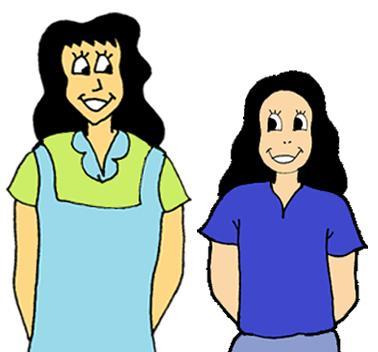
Mommy
Pat, what would you like to eat? What can I get you?
Pat
I’d like some rice and some fish please, Mommy.
Mommy
All right. Here is some rice and some fish for you. Is that enough rice?
Pat
Yes, thank you. That’s enough. That’s enough rice for me.
Mommy
What about eggs? Would you like one egg or two?
Pat
Only one egg please, Mommy. One egg is enough.
Mommy
All right. Let me give you a good egg. Here you are.
Pat
Thank you, Mommy. Thank you very much. That’s enough now. Thank you.
Mommy
All right. Now, what about your daddy? Where is he? Where’s your daddy? Doesn’t he know dinner is ready now?
媽媽
佩特,你想吃什麼?需要我給你盛點什麼?
佩特
我想要米飯和魚,拜託了,媽媽。
媽媽
好的。這是給你的米飯和魚。米飯夠嗎?
佩特
已經夠了,謝謝。這些米飯對我來講足夠了。
媽媽
那雞蛋呢?你想要一個還是兩個雞蛋?
佩特
請只給我一個雞蛋,媽媽。一個雞蛋就夠了。
媽媽
好的,給你一個好吃的雞蛋,給。
佩特
謝謝媽媽,很感謝您。已經夠了,謝謝。
媽媽
好。對了,你爸爸呢?他在哪?你爸爸在哪?他不知道晚餐好了嗎?
**********
Mommy really wants Lee to eat his dinner now. “Come on Lee,” she says. “Eat your dinner. You don’t want it to get cold. Would you like one more egg?” “Yes, please,” says Lee. “Please give me one more egg. And a little more rice, please.”
媽媽真的希望李現在就吃他的晚餐。“快點,李,” 她說,“吃你的晚餐。你不想晚餐變冷吧?你還想再要一個雞蛋嗎?” “好的,請給我吧,” 李說,“請再給我一個雞蛋,請再給我一點米飯。”

“Here you are,” says Mommy. “And would you like a little more meat?” “Yes please,” says Lee. I’d like a little more meat, and I think my friend Tom would like a little more meat, too.”
“給你,” 媽媽說,“你還想要一點肉嗎?” “好的,請給我吧,” 李說,“我想要再多一點肉,我覺得我的朋友湯姆也還想再要一點肉。”
“I think your friend Tom would like a lot more meat,” says Pat. “I think he would like a lot more meat, a lot more rice, a lot more eggs and a lot more fish,” says Pat. “Every day at school, I see he eats a lot more than all of the children. He eats a lot more than the teacher. I think he wants to eat a lot more than all of us here today, too!”
“我覺得你的朋友湯姆還想要很多肉,” 佩特說,“我覺得他想要更多的肉,更多的米飯,更多雞蛋和更多魚。” 佩特說,“每天在學校,我看見他吃的比其他孩子都要多很多,他吃的比老師還要多很多。我覺得他今天想吃的比在這裡的所有人都要多很多!”
**********
Questions
1. Who is getting dinner ready?
2. Is there a lot of rice for dinner today?
3. Are there a lot of eggs?
4. How many eggs would Pat like?
5. How much more meat would Lee like?
6. How much more food does Pat think Tom wants to eat?
**********
27. I can see you are very hungry today 我看得出來你今天很餓
New Words:
No new words
**********
Today, Mommy is very happy. She is happy to see her children and their friend eating dinner. She likes to see the children eat, and she wants them to eat a lot. “Lee, Pat, Tom!” she says. “Would you like some more fish?”
今天媽媽非常開心,她很開心見到她的孩子們和他們的朋友一起吃晚餐。她喜歡看孩子們吃晚餐,她希望他們多吃點。“李,佩特,湯姆!” 她說,“你們還想再要些魚嗎?”
“Yes, please,” says Lee. “I’d like some more fish and I think my friend would, too. I think all of us like fish. That’s right, isn’t it, Pat?”
“好的,拜託了,” 李說,“我想要再來點魚,我覺得我的朋友也想要。我覺得我們都喜歡魚。我說對了,是不是,佩特?”
“No, it isn’t,” says Pat. “I don’t like fish very much.” “Don’t you?” says Tom. “I do. I really like to eat fish!”
“不,不對,” 佩特說,“我不是特別喜歡魚。” “你不喜歡?” 湯姆說,“我喜歡,我真的很喜歡吃魚。”
“You like all food,” Pat says to Tom. “You like all food and you eat a lot of it. You like rice and you like meat. You like eggs, fish, meat, bananas, apples, ice-cream… You like all food and you like to eat all the time!”
“你什麼都喜歡吃,” 佩特對湯姆說,“你喜歡所有食物,你吃很多食物。你喜歡米飯,你喜歡肉。你喜歡雞蛋、魚、肉、香蕉、蘋果、冰激凌……你喜歡所有食物,你總是在吃!”

“You are right,” says Tom. I really like to eat. I like to eat a big breakfast. I like to eat a big lunch, and I like to eat a big dinner, too. I really like to eat, and I eat a lot more than all our friends at school. I eat a lot more than my mommy and daddy, too!”
“說得對,” 湯姆說,“我真的很喜歡吃。我喜歡吃一頓豐盛的早餐。我喜歡吃一頓豐盛的午餐,我也喜歡吃一頓豐盛的晚餐。我真的很喜歡吃,我比學校裡我們所有朋友們都吃的多。我比我的媽媽爸爸吃的還多很多。”
**********

Daddy
Excuse me, Mommy.
Mommy
Yes?
Daddy
Would you give me some more rice, please?
Mommy
I’m sorry. Isn’t that enough for you? Here you are. Here is some more rice for you. I can see you are very hungry today.
Daddy
Yes, I am. Thank you. Thank you very much. That’s enough now.
Mommy
Would you like something to drink?
Daddy
Yes, I would. What is there to drink today?
Mommy
There’s some orange-juice, there’s some water, and there’s some milk.
Daddy
I’d like some water, please. Is it cold? Today is very hot and I’d like to drink cold water.
Mommy
Yes, it is. It is very cold. Here you are. Here is some cold water for you.
爸爸
打擾一下,媽媽。
媽媽
怎麼了?
爸爸
能不能請你再給我些米飯呢?
媽媽
抱歉,那些不夠你吃嗎?給你,這些米飯給你。我能看出來你今天很餓。
爸爸
是的,我很餓。謝謝,非常感謝,現在夠了。
媽媽
你想要喝什麼東西嗎?
爸爸
想,今天有什麼喝的?
媽媽
有橙汁,水,還有牛奶。
爸爸
我想喝水,謝謝。是冰水嗎?今天很熱,我想喝冰水。
媽媽
是的,很冰涼的水。給你,這是你要的冰水。
**********
Today, Lee, Pat, Mommy and Daddy are sitting together at the dinner table. Lee’s new friend Tom is there, too. All of them are eating. Lee is very happy that his friend can come and eat in his house. Tom is very happy. Tom is happy that he can come to Lee’s house and eat dinner with his friend.
今天,李、佩特、媽媽和爸爸一起坐在餐桌前,李的新朋友湯姆也在。他們都在吃飯。李很高興他的朋友能來他家吃飯。湯姆很高興,湯姆很高興他可以來到他的朋友李的家裡和李一起吃飯。

What about Lee’s sister? What about Pat? Is she happy, too? No, she isn’t. Pat is not very happy. Pat does not like Lee’s new friend very much. Pat likes her friends. She does not like Lee’s friends very much. Pat likes the friends she has at school.
李的妹妹呢?佩特呢?她也高興嗎?不,她不高興,佩特不是很高興。佩特不是很喜歡李的新朋友。佩特喜歡她的朋友,她不是很喜歡李的朋友。佩特喜歡她學校的朋友們。
Pat would like her school friends to come and have dinner in her house. She wants to have dinner with her friends. She does not want to have dinner with Lee’s friends.
佩特想要她學校的朋友們來家裡吃晚餐。她想要和她的朋友們一起吃晚餐,她不想和李的朋友們一起吃晚餐。
**********
Questions
1. Is Mommy very happy today?
2. What about Pat?
3. Who really likes to eat fish?
4. Is it cold today?
5. What does Mommy give Daddy to drink?
6. Who would Pat like to come and have dinner with her?
**********
28. I like the food you give us every day 我喜歡您每天給我們的食物
New Words:
No new words
**********
Mommy is asking the children about the food. “Do you like your dinner today?” she asks. “Is it all right?” “Yes,” says Pat. “It’s a very good dinner today. I really like it. I like the food you give us every day.”
媽媽在問孩子們有關食物的問題。“你們喜歡今天的晚餐嗎?” 她問,“還好嗎?” “是,” 佩特說,“今天的晚餐很好,我非常喜歡它。我喜歡您每天給我們的食物。”
“Me, too” says Lee. “I like dinner today, and my friend Tom does, too. We all like dinner today. It’s very good and there is enough of it.” “Good,” says Mommy. “I’m happy that you like your dinner, and I’m happy that you think there is enough of it.”
“我也是,” 李說,“我喜歡今天的晚餐,我的朋友湯姆也喜歡。我們都喜歡今天的晚餐。它非常好吃,而且夠吃。” “好,” 媽媽說,“我很高興你們喜歡你們的晚餐,我也很高興你們覺得晚餐量夠足。”

“I like it when we all sit and have dinner together,” says Lee. At school, I like to sit with my friends at lunchtime and eat lunch together. At home, I like to sit with my mommy, my daddy and my sister to have breakfast and dinner. Today, I’m very happy that I can have dinner at home with my new friend. Thank you for letting my new friend come and have dinner with us.”
“我很喜歡我們都坐在一起吃晚餐的時候。” 李說,“在學校,午餐時間我喜歡和我的朋友們坐在一起,一塊吃午餐。在家,我喜歡跟我的媽媽爸爸和妹妹坐在一起來吃早餐和晚餐。今天,我很高興能夠在家和我的新朋友一起吃晚餐。謝謝你們讓我的新朋友來和我們一起吃飯。”
**********

Lee
Dinner in my house is very good, isn’t it?
Tom
Yes, it is. I really like this food. I like it more than the food we get at school.
Lee
Really?
Tom
Yes. And there’s more of it, too. Your mommy gives us more food than we get at school when we have lunch.
Lee
Yes, I think that’s right. My mommy really likes to give us lots of food.
Tom
I can see that. Lee, would you get me some more rice please?
Lee
All right. Here you are. Is that enough? I can see you are very hungry today?
Tom
Yes, that’s enough. Thank you. And you are right. I am very hungry today. I am very hungry every day.
李
我家的晚餐好吃吧?
湯姆
是的,我真的很喜歡這些食物,比學校裡的食物更喜歡。
李
真的嗎?
湯姆
真的,而且分量足。你媽媽給我們的食物比我們的午餐還多。
李
是啊,我也這樣覺得。我媽媽真的很喜歡給我們很多食物。
湯姆
我能看出來。李,能請你再給我些米飯嗎?
李
好,給你,這麼多夠嗎?我能看出來你今天很餓?
湯姆
是的,這就夠了,謝謝你。你說對了,我今天很餓,我每天都很餓。
**********
“How about your dinner today, Tom?” asks Mommy. Do you like it? Is there enough for you?” “Yes, I do like it,” says Tom. “I like it very much, and there is enough of it. Thank you. Thank you for dinner and thank you for letting me come to your house.”
“湯姆,你今天的晚餐怎麼樣?” 媽媽問,“你喜歡嗎?對你來說夠不夠?” “是的,我確實很喜歡。” 湯姆說,“我非常喜歡,量很足。謝謝您,謝謝您的晚餐,謝謝您讓我來你們家。”

“That’s all right,” says Mommy. “We are happy to have you here. We like to see Lee’s friends, and we like them to come to our house. We like to see Pat’s friends, too. A lot of Pat’s friends come to our house to play with Pat and eat dinner with us.”
“這沒什麼,” 媽媽說,“你在這裡我很開心。我們喜歡見李的朋友,我們喜歡你們到家裡來。我們也喜歡見佩特的朋友,佩特的很多朋友都來我們家和佩特玩,和我們一起吃晚餐。”
“It’s not only the food here that I like,” says Tom. “I like the house, too. I like Lee. I like his mommy and daddy. I like Lee’s dog too, but I really do like the food in this house. I like it very, very, very, very much!”
“我不僅喜歡這裡的食物,” 湯姆說,“而且也喜歡這間房子。我喜歡李,我喜歡他的爸爸和媽媽。我也喜歡李的狗,我真的很喜歡這間房子裡的食物。我非常非常,非常非常喜歡!”
**********
Questions
1. Does Pat like her dinner today?
2. What about Lee?
3. At school, who does Lee sit with at lunchtime?
4. Would Tom like some more rice?
5. Who does Tom thank for letting him come to Lee’s house?
6. What does Tom really like?
7. How much does he like it?
********** The End
Thank you for making it to the end of our book. To continue learning with
Word by Word
Graded Readers, please move on to Book 6:
‘Lee and Pat like animals. ’
感謝您讀完本書,繼續學習《循序漸進學英語》分級讀本,請看第6冊:
《李和佩特喜歡動物》

To see the full range of Word by Word graded readers for children, please visit
our website at:
查看《循序漸進學英語》全套少兒英語分級讀本,請訪問我們的網站:
Example Answers to Questions 課後提問參考答案
Example answers to questions
課後問題答案範例
(Remember – there are often several different ways of correctly answering the questions)
(注意往往有多種不同的方式正確回答問題)
1.
1. They are playing in the garden.
2. Yes, they are.
3. They are eating candy (sweets).
4. Yes, they do.
5. No, it is not.
2.
1. Yes, I do. / No, I don’t.
2. Their dog’s name is Kim.
3. He gives his red ball to Pat.
4. Yes, they can.
5. Yes, she does.
3.
1. Yes, I do. / No, I don’t.
2. Yes, they can.
3. Yes, it is.
4. No, he does not.
5. He wants to play the game with his friends.
4.
1. He is with his new friend. He is with Tom.
2. He takes Tom to his room.
3. He wants to see what Lee has in his room.
4. Yes, she does.
5. No, she does not.
5.
1. Daddy. Daddy does not want the children to play in the trees.
2. No, they are not.
3. Tom is Lee’s friend.
4. Yes, he does.
5. No, she does not.
6.
1. No, there are not.
2. When it is cold. The children like to go in the house when it is cold.
3. They are in the house. They are in Lee’s room.
4. No, he does not.
5. No, he isn’t.
6. The teacher. Lee wants the teacher to read his big book.
7.
1. There are two books on the table.
2. Yes, she does.
3. She wants to take them to school.
4. She wants to read her book with her friends.
5. Tom has a lot of books now.
6. No they are not. Some of them are old.
8.
1. Yes, it is.
2. They can take them to Lee’s room.
3. He can ask Pat.
4. Yes, she can.
5. She likes to read to her friends, and she likes to read to Lee.
6. No, she doesn’t (does not).
9.
1. It is hot.
2. Tom wants to drink orange-juice.
3. She drinks milk every morning.
4. She wants him to drink it in the garden.
5. No, he is not.
6. Yes, he does.
10.
1. He is with Tom.
2. They are in the garden.
3. No, it is not.
4. Yes, there is.
5. Yes, it is.
6. Yes, there is.
11.
1. No, she does not.
2. Mommy. Mommy is getting breakfast for the children.
3. Yes, he can.
4. He wants to eat a lot.
5. Yes, it is.
6. He sits down at the breakfast table.
12.
1. Yes, he is.
2. Mommy is. Mommy is getting breakfast.
3. He can sit down at the breakfast table.
4. Yes, there are.
5. Yes, there is.
6. She can put the food on the breakfast table.
13.
1. Mommy can. Mommy can give the children their breakfast.
2. He only wants a little.
3. Pat has one egg.
4. He wants a lot. Tom wants a lot of meat.
5. Tom likes all food.
6. I like…
14.
1. They are sitting at the breakfast table.
2. Yes, it does.
3. Tom does. Tom likes all food.
4. He is eating rice, fish meat, eggs and bananas.
5. No, she is not (isn’t).
6. He likes to drink a lot of orange juice at breakfast.
15.
1. Two. Lee reads two pages from his reading book every day.
2. Yes, they are.
3. They can ask the teacher.
4. He is at Lee’s house.
5. They can ask the teacher.
6. Yes, she does.
16.
1. Yes, she does.
2. Yes, there are.
3. Pat. The teacher wants to see Pat.
4. In the classroom. The children are writing in the classroom.
5. Yes, she is.
6. She wants the teacher to see that all her writing is good.
17.
1. Yes, she is.
2. She wants them to write down some new words.
3. Yes, she does.
4. She wants them to look at the new words she is writing.
5. Yes, there are.
6. Yes, he can.
18.
1. Tom is writing more than Lee.
2. No, they are not.
3. She wants him to write more new words.
4. Pat is more careful.
5. No, he does not.
6. Yes, they can.
19.
1. They are playing in the school garden.
2. Yes, it is.
3. No they cannot (can not, can’t)
4. He can go and look in the classroom.
5. She wants to see Lee.
6. No, he doesn’t (does not).
20.
1. No, he is not.
2. In the garden. Tom is in the garden.
3. Yes, they are.
4. Yes, he can.
5. Pat. Pat is good at writing.
6. No, he does not.
21.
1. She wants him to write about his mommy and daddy.
2. He can ask the teacher, or he can ask his sister, Pat.
3. Yes, they are.
4. Tom. (Tom is very hungry today. )
5. No, it isn’t.
6. When it is the right time. (They can go for lunch when it is the right time. )
22.
1. Yes, it is.
2. Tom is very, very hungry.
3. Yes, there are.
4. No, there are not.
5. There is a lot of rice.
6. There are a lot of eggs.
23.
1. Tom (He) wants a lot more meat.
2. Yes, she does.
3. He would like a lot more rice.
4. He would like to drink orange-juice.
5. Lee would like to drink water.
6. He likes to drink orange-juice at breakfast.
24.
1. He is walking home with his new friend, Tom.
2. They are looking at a cat.
3. Yes, he would.
4. Yes, she does.
5. Lee is not very hungry.
6. When they get home.
25.
1. He wants to get to know Lee’s new friend, Tom.
2. He really likes his school lunches.
3. Yes, she is.
4. They try to read two new pages and write one new page every day.
5. No, it is not.
6. Tom likes to eat ice-cream all the time.
26.
1. Mommy. Mommy is getting dinner ready.
2. Yes, there is.
3. Yes, there are.
4. Pat would like only one egg.
5. Lee would like a little more meat.
6. Pat thinks Tom would like to eat a lot more food.
27.
1. Yes, she us.
2. Pat is not very happy today.
3. Tom does. Tom really likes to eat fish.
4. No, it is not. It is hot today.
5. She gives him (Daddy) some cold water.
6. She (Pat) would like her friends to come and have dinner with her.
28.
1. Yes, she does.
2. Lee likes his dinner, too.
3. He sits with his friends.
4. Yes, he would.
5. He thanks Lee’s mommy.
6. He really likes the food.
7. He really, really, really, really likes it!
Notes for Teachers and Parents 給教師和家長的註解
Expressions語句表達
What about you?
I really like it!
… all the time
I see. = I understand.
Not yet.
Really?
Not really.
Would you like…?
Yes, I would.
I would like…
Me, too!
How are you?
****************
Structure Notes句型註解
Question forms問題形式
How much…?
How many…?
When…?
Is there…?
Are there…?
Tag questions反義疑問句
…, is it?
…, isn’t it?
e. g.
“That’s not very good, is it?”
“My writing isn’t very good yet, is it?”
“It’s very hot today, isn’t it?”
“Yes it is, isn’t it?”
a lot / a little許多/一點
e. g.
We can see a lot of children.
Lee and Pat have a lot of friends.
“I only want to eat a little.”
“You can have a little more rice.”
Countable / Uncountable nouns可數/不可數名詞
e. g
There is a lot of food .
There is a little meat .
There are some eggs .
There are a lot of words .
Contractions縮寫
don’t = do not
doesn’t = does not
can’t = cannot = can not
he’s = he is
she’s = she is
I’m = I am
you’re = you are
isn’t = is not
What’s. . ? = What is… ?
I’d like… = I would like…
some of / all of / one of / two of……中的一些/全部/一個/兩個
e. g.
Some of the balls are red.
We know some of the children.
“Who knows all of the words?”
“Not all of them are new.”
One of the books is black.
One of them is red.
Two of the words are new.
Only one or two of them are old.
Phonic emphasis重讀音節
All the balls are small.
L ee can s ee me .
We can see the cat in the tree.
Tom likes to drink a lot of orange juice when it is not hot.
Plural possessive form複數所有格
The teacher wants the boys’ writing to be good.
I think those balls are the girls’ balls.
Is the boys’ game easy?
Can Lee and Tom take the girls’ balls ?
The teacher is putting lunch on the children’s tables .
****************
A gentle reminder
溫馨提示
Thank you for making it to the end of our book. To continue learning to read, please move on to Book 6: ‘Lee and Pat like animals’.
感謝您學完本書,歡迎繼續學習第6冊:《李和佩特喜歡動物》。

See all the Word by Word readers at:
查看《循序漸進學英語》全部系列叢書,請訪問以下網站: